#to what extent were they brainwashed into thinking this was the only option. or the best option. or whatever else
Explore tagged Tumblr posts
Text
i think a bit of a loss from a deleted scene in the first hunger games film is in the tribute interviews where marvel says to caesar "if you apply yourself and you focus then all your dreams can come true". like that boy was really on the alpha male grindset culture and it's a shame that wasn't included because it's real. because, especially 11 years down the track, it is a valid critique of hustle culture. marvel was from district 1, he had privileges that kids from the outlying districts didn't have. so when he says "just apply yourself", it won't just happen in that way for the people he's talking to across panem, because even their dreams of surviving the day may not come true, no matter how hard they work. that said, he's still perpetuating this ideal when he's under the oppressive thumb of the capitol. not only is he a district pleb, but his entire life has been in service of being a sacrifice for the capitol's entertainment. sure, he could win, but he's seen the games. he's seen the victors. he would know, even if it's just on the smallest and most hidden level, that a victor's riches pale in comparison to the trauma they must cope with for the rest of their life. even in this interview, where he's playing up that 'he always dreamed of killing people', even if he won his games, the ideal of being treated as an equal, or simply seen as human, cannot come true, no matter how much he focusses on that goal. sure he says he's always wanted to volunteer for these games (which may be true in part, but he's almost definitely putting on an act for the camera. most of the tributes probably are. we talk about the physical training careers must have gone through but in katniss' narration it's made clear that the hunger games is a reality show, first and foremost), but even if you take that at face value, even if you go "this kid just really liked torturing other kids", there's no guarantee of winning. just a promise that you'll come back in a box or riddled with mental scars. he could work as hard as he wanted to, try as hard as he could, but there are so many variables that would block him from winning. i don't know if he would know this or not; the careers are all children, some arrogant, some fearful, many both. but he spreads this rhetoric, as though it were true, as though it were true for him, just like "alpha male" commentators do today, just like mlm promoters. he very partially benefits from this system, yes, but it costs his life. and not just from the moment he entered the arena. people today say "get up your ass and work" or "it's not that hard, Just Do It" or "elongated muskrat did it, so i'll be able to too", ignorant of or unwilling to mention the privilege of those who succeeded, not discussing those who applied themselves and focussed and came up short because the odds weren't in their favour.
#thg#the hunger games#is this a late night rambling? yes. is it good? no. will we cope? yes.#i think the careers are interesting because they are traumatised like the other tributes. and. just as dead.#yeah it's a bit of a shame this got cut because doesn't it reek of modern elon musk fanboy#marvel hunger games#and no im not a career apologist (fully) because they do appear to take pleasure and pride in killing.#but i say not fully because. well. they're kids. kids with an awareness of their actions but kids.#to what extent were they brainwashed into thinking this was the only option. or the best option. or whatever else
25 notes
·
View notes
Note
https://www.tumblr.com/skaruresonic/766227191005577216/so-clean-sweep-has-just-been-exposed?source=share
"How do they think this is going to reflect on them?"
Something like that would require to the writers to think about what they wrote beyond vibes and vague understanding of tropes. So I wouldn't count on it ever being brought up.
If they do bring up the topic they'll somehow spin it so that Sonic's the one responsible for every bad thing to ever happen. This comic only brings up the negative implications of things when the writers want to make a game character look incompetent or scummy.
Lanolin's hot head tyrant personality almost got people killed during the race. Sonic saved those people but he's still definitely the worst person ever because we say so. That's how this comic is.
They won't talk about how bad this makes the restoration look. They're gonna warp the narrative to make Sonic and his friends look like idiotic villains even if that conclusion is completely illogical.
Yeah I didn't mention it too much in my reactions, but there was an odd emphasis on public perception throughout this arc. Tails and Amy are suddenly worried about "ruining" the race by breaching the Restoration shuttle. It's one of the reasons they chose not to take the infinitely simpler option of flying up there on the Tornado.
Sonic being revealed to be the Phantom Rider in front of his friends is treated like a hard-hitting moment of betrayal (to the point where Tangle, standing frozen in shock, would have been crushed under a falling rock if Whisper hadn't pulled her away. and no, I am not making that up)... but it kind of doesn't mean anything if he doesn't ultimately care.
Surge suddenly grows to care about the public's adoration where before she didn't care about the world. Because praise kink is enough to override her brainwashing, apparently.
Clutch is instantly exposed in 4K HD through a public broadcast.
Given this emphasis on PR, logically people should have questions about how Clean Sweep managed to fool the Restoration. Not only did Clean Sweep poison water, land, and air to a seemingly Eggman-esque extent that it's tainted crops, they're said to have "falsified records" and "violently silenced" whistleblowers. How they failed to notice any of this, especially given everyone's sensitivity to the environment following Forces and the metal virus, is beyond me.
You mean Jewel, whose existence revolves around doing paperwork, was fooled by forged documents?
You mean Lanolin, who has a huge stick up her ass about keeping her people in line, was so remiss at vetting a company that wanted to work with her organization that she didn't notice folks were being tied up and stuffed into closets?
You mean the organization dedicated to making the world a better place, at best, failed to notice the MASSIVE AMOUNTS OF POLLUTION their sponsor was getting up to?
In a more coherent narrative, there's no way people wouldn't connect the dots. All of this combined would imply a massive failure on the Restoration's part and possibly damage their reputation.
20 notes
·
View notes
Text
brainrot on the apollo!ray au
AU credit to @just-like-playing-tag! (check out the apollo ray tag!)
I always thought it was a bit odd that the lambda kids were so adamant on hating demons but we don’t really see how they feel about the ratris or how that affects their views on adults/other humans
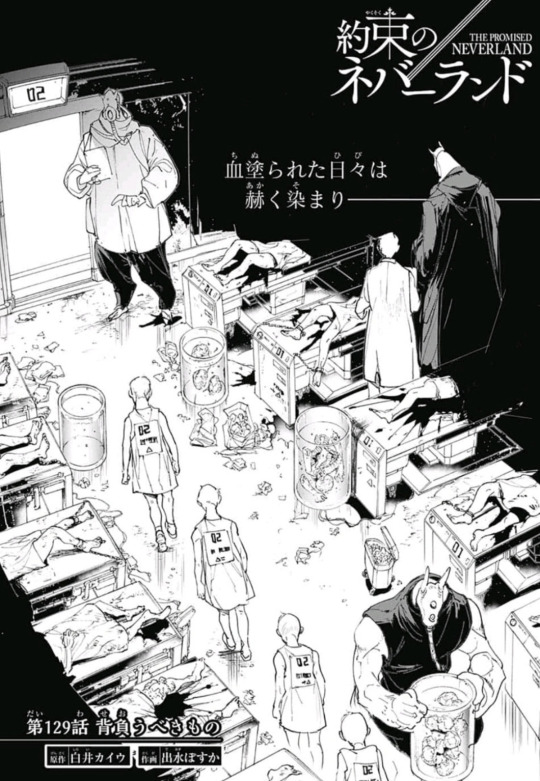
they were experimented on by human AND demon researchers
They were the first kids to find out the difference between wild demon intelligence/consciousness and ability to have morality but they still treat them all the same
TPN has crafted a narrative of humans vs demons but doesn’t acknowledge how much the children might hate/resent those who put them in this position
It’s probably because every human forced to sell out the kids is painted in a sympathetic light in some way (except Andrew)
Legirivima/Peter was seen as brainwashed by their own delusion about their glorious lineage/history and it was a problem of the indoctrination they grew up in and the expectations/mindsets that were pressured onto them
It was glossed over in Isabella’s death and lack of living to make up for what she put each of the kids though (ray specifically)
So it's kinda never adressed in canon how cruel the kids are willing to be to those who are somewhat responsible for putting them in this position regardless of if they are demon or not (as I've addressed here with goldy pond specifically)
I think apollo!ray’s attitude vs Norman’s regarding demons would be similar to how they treat adults by only seeing their enemies (no matter what/who they are) as monsters
Norman went out of his way to ensure he wouldn’t be rebuilding the freedom of the children on top of the ratri’s legacy by doing the same thing they did (subjecting future generations to cloning experimentation/inhumane treatment) even though that was an option he could have gone with when allying with Gleelan
He could have given live Ratris to Gleelan to prove he was willing to screw over adults in order for the children to live (which I imagine apollo!ray would be cruel enough to do in this AU) but this shows there is a line when it comes to Norman’s morality he won’t cross
This shows how much norman values humanity regardless of who they are, ratri or not
His plan was for the demons to destroy themselves but he had no plan for the ratris afterward and i think it shows much how much norman unconsciously took inspiration from emma
Norman thought humans wouldn’t hurt/be prejudiced against the children if the demons weren’t putting them in that situation in the first place (he believes in natural goodness to an extent when push doesn’t come down to shove)
I think it reflects on how different his relationship with Isabella was
He asked if she was happy. He does understand (not agree with) her perspective of lying so the kids have a happy life (which he did with Don and Gilda and continues to do with Lamba squad later)
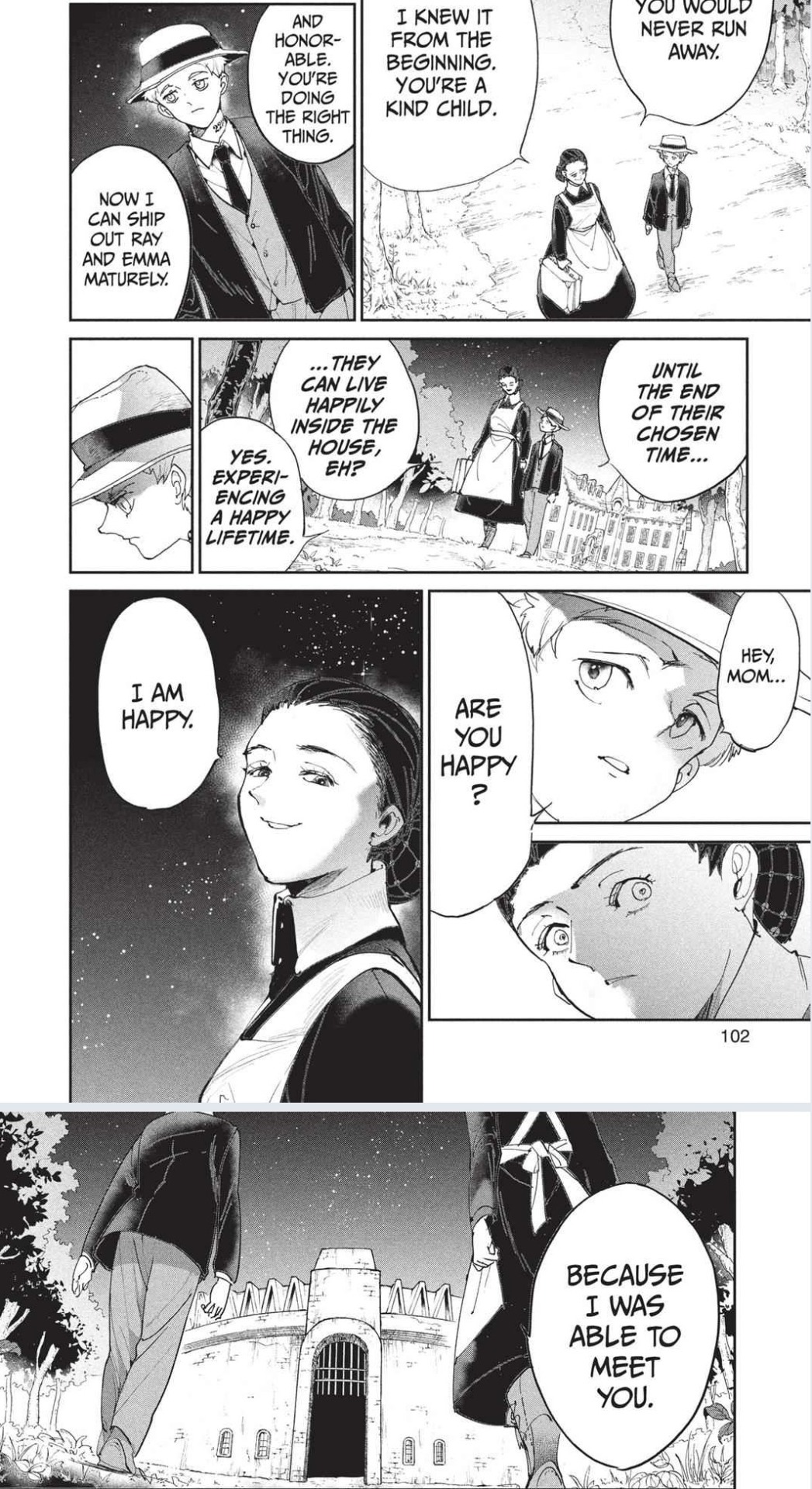
Despite calling her a demon at the beginning (which you can clearly see Emma is more uncomfortable with, but accepts given their desperate situation)
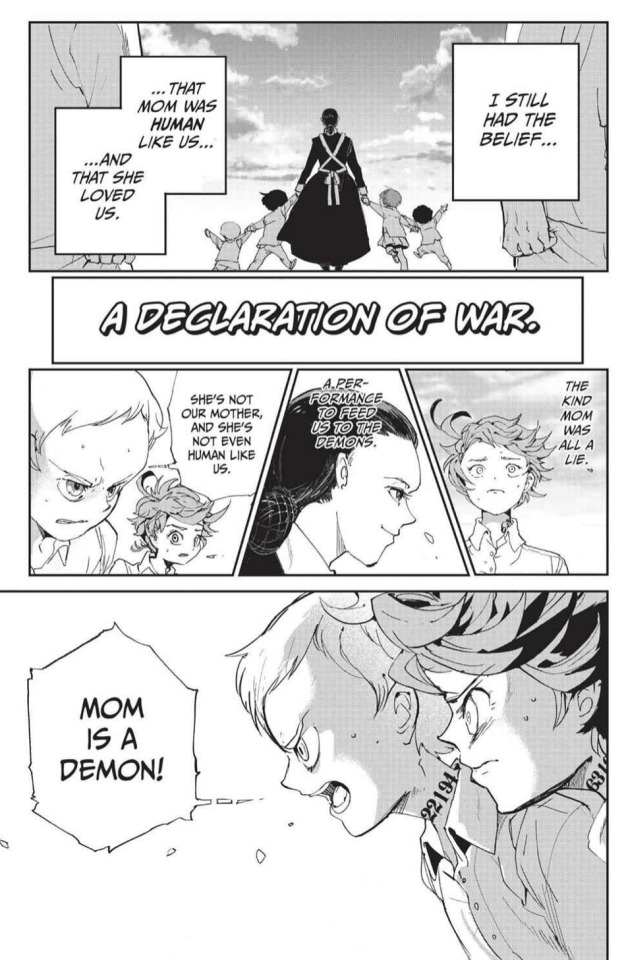
they both (eventually) see her as a human forced into this situation doing the best with what she can

He doesn’t want to kill her but he will (reluctantly) to secure the safety of his family
HOWEVER
RAY IS NOT LIKE THAT
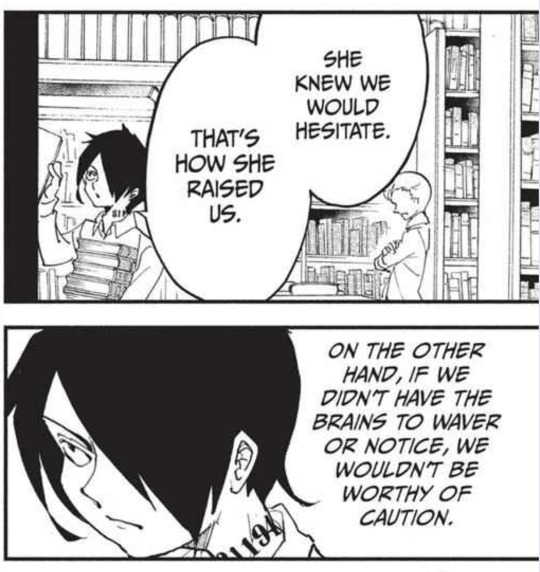
HE IS FULLY WILLING/READY/ABLE TO KILL
To be burdened in a way Norman never was
By taking demon AND human lives
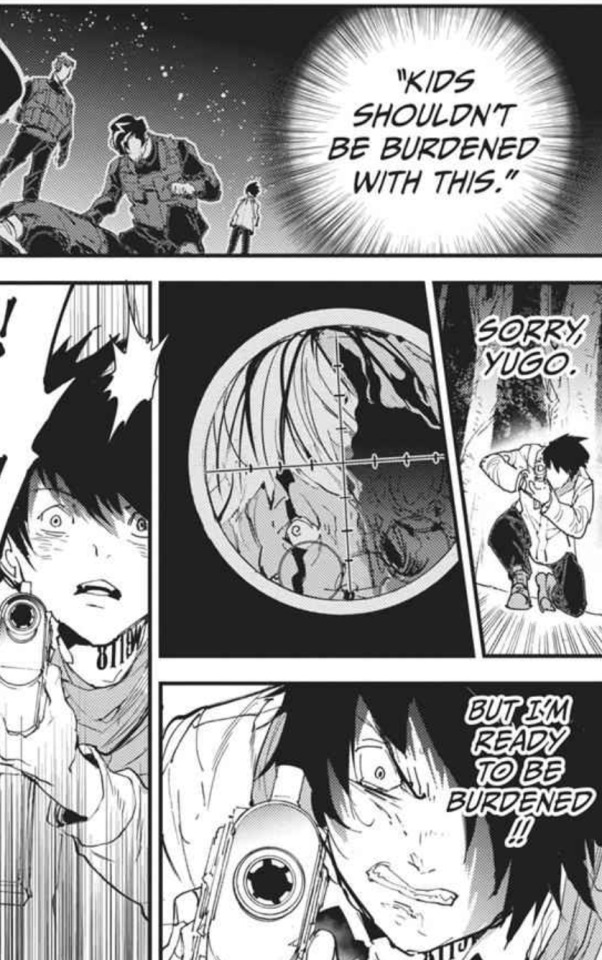
I imagine apollo!Ray would actually enjoy the torture of demons because it’s a way to vent after all he went thru via Isabella
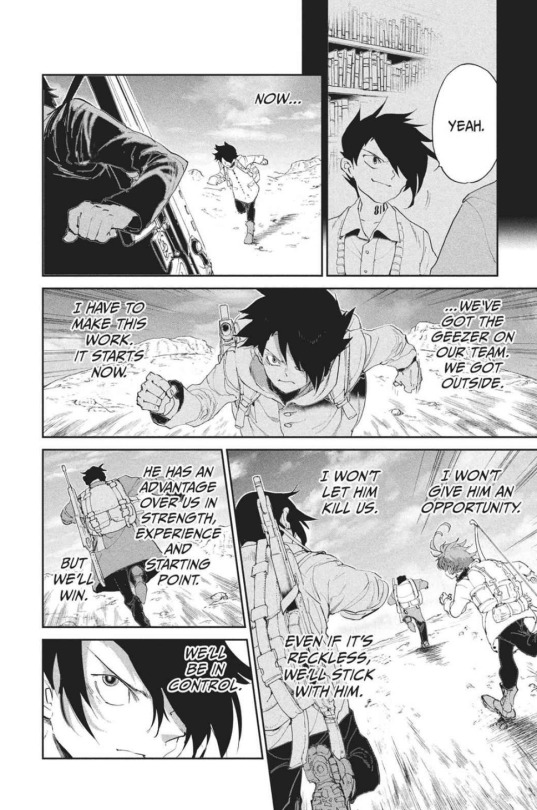
Straight out of Grace field and Ray is most concerned about what control he has in the situation because that’s what he learned from isabella
Causing the demons pain and being encouraged by the other lambda kids would probably turn that need for control into violent tendencies that he is willing to take out on the demons
The only humans Ray has ever seen survive were those willing to climb over corpses and without meeting yuugo/lucas or any other adult/escapees to disprove this he fully believes Emma is being unrealistic and unreasonable and doesn’t go on to adopt any of her positive worldviews like Norman does/strives to
#the promised neverland#tpn#ynn#yakusoku no neverland#yakusoku no neverland norman#yakusoku no neverland ray#yakusoku no neverland emma#emma yakusoku no neverland#ray yakusoku no neverland#norman yakusoku no neverland#the promised neverland norman#the promised neverland ray#the promised neverland emma#emma the promised neverland#ray the promised neverland#norman the promised neverland#tpn norman#norman tpn#ynn norman#norman ynn#tpn ray#ray tpn#ynn ray#ray ynn#emma ynn#ynn emma#tpn emma#emma tpn#analysis#theory
11 notes
·
View notes
Text
PERSONA 5 TACTICA IS NOT GREAT: A VERY ODDLY-CONSTRUCTED RANT
Pt. 2: The Phantom Thieves With No Heart
We'll start things off by bringing up what I said earlier about the characters and how I don't think the vast majority of them are any good, with only the three exceptions mentioned previously.
"But wait," I might hear you ask. "You said two out of the three were Futaba and Yusuke. Does that imply that the rest of the thieves aren't as good by comparison?"
And to that, I say, ".......yes."
I don't know what happened here, but the Phantom Thieves aren't Phantom Thieve-ing. And by that, I mean, not only are they written rather bland, but they contribute almost *nothing* to the plot, outside of the obvious combat segments that are just there for gameplay's sake. They might have a *few* moments here or there, but when I say "few", I MEAN "few".
To make things easier in order to get my point across, I'm gonna go down the list of Phantom Thieves that aren't Futaba and Yusuke, starting with:
ANN TAKAMAKI
I'm gonna be honest here: I can't think of a *single* moment Ann had any relevance or contribution to the plot or any character development outside of when she was brainwashed by Marie at the beginning of the game, and even then, you could make the same argument for every other thief that wasn't Morgana or Joker.
There's also the aforementioned Samurai scene, but it's there to run the same joke of, "Ann's a terrible actress". I will admit, it is funny, and Yusuke saves it by spinning it to say she's wasted, but my point still stands. And as I've stated, this is one of two optional scenarios, so you might not even see this scene.
At least in Strikers, Ann gets the first arc, where she relates to and sympathizes with Alice Hiragi, our first antagonist. Tactica leaves her out to dry.
Also, in the first arc, Toshiro constantly brings up her leather suit, and it gets old and uncomfortable real fast.









So, yeah. Ann gets nothing. She loses.

MORGANA
Morgana is the same old same old, but that isn't saying much, because....it's Morgana. He serves as your tutorial guy for the beginning, while constantly correcting people that he is indeed not a cat (except that he is, don't deny what is the truth).
The only thing I can compliment him on is how he calls Lavenza "Miss Lavenza". I don't know, it's cute. It shows how much he respects her (don't know if I should call them siblings, considering Morgana's origins).
Aside from that, I really have nothing else to say about Morgana. I never liked Morgana to begin with, and that still holds true in Tactica.
MAKOTO NIIJIMA
Makoto has never really been my favorite Phantom Thief by any stretch of the definition, but even I can tell that they did her dirty here.
Once again, she does nothing for character growth or plot, and is left for some cheap jokes that usually result in her threatening someone's life. I can only think of *one* time she did something for the plot, which was ask Futaba to hack into Yoshiki's cameras to show the citizens what the camps have been doing to the people taken there.




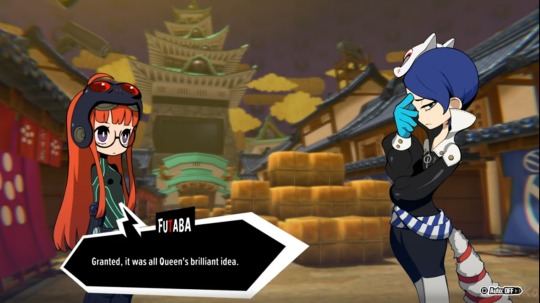
But aside from that, that's all Makoto really contributes....
...which makes it all the more aggravating when you remember that Makoto's supposed to be the TACTICIAN of the group!

EVEN THE GAME SAYS SO!!



But you want to know the real kicker here? While Makoto doesn't do any strategizing, you know the characters that DO?
Toshiro and FUTABA!





Okay. To an extent, I get Toshiro. But Futaba? She's the HACKER. I mean, in regards to what she should hack and the timing of it, I understand, but not full-on strategy on the WHOLE operation! And even if you want to include Futaba into this, why not include Makoto as well?? If you want to push the idea that she's the strategist of the Phantom Thieves, then have her participate in this discussion!! I love Futaba as much as the next guy, but it's clear to me the writers or someone on the writing team *really* liked Futaba.
What I'm trying to say is, just give Makoto her role back, man! Because apart from that one moment (plus her losing her cool at an aizen during the Samurai/Geisha scene), she really has nothing else.
HARU OKUMURA
Okay, in all fairness, even in the first game, Haru really didn't have much going on. There's a reason "Haru Didn't Get Enough Screen Time" became a meme. She was only ever relevant for the Okumura arc, where she teams up with Morgana during his split with the PT, and after some running around and whining, he makes up, and Haru joins, wanting to change her father's heart. Then he dies, she gets sad over it, and she then proceeds to just fade in the background for the rest of the game.
That isn't to say Haru wasn't a good character. She was decent. The problem is, due to her lack of screen time and contribution (and Morgana), she never really had a chance to develop as a character, especially with her comrades. I'd argue that if you took her out of the original game, the thieves' dynamic and the story as a whole wouldn't change by much.
Then Strikers swooped in and saved her character. Due to the nature of it being a sequel, the game understands that we don't need to reintroduce the characters again, and just lets them have fun. And boy, did they have fun with Haru. Not only did she get two funny running gags - one of which being paid off through means of her almost killing her friends - but she gets an entire arc focused on her, where she reconnects with an old friend that has lost her way due to guilt and blackmail. It's so touching, and shows just how much Haru has grown as a character from the first. Screw the Okumura arc, replace it with the Sapporo arc! Also, she's terrifying.
I was then expecting Tactica to follow through with this, giving us a very adorable, yet sadistic floof ball. But... no.
Just like everybody else here, she serves no purpose to the plot; she's been soul-sucked, giving zero laughs or character development whatsoever-
Okay, that's a semi-lie, because she actually has one scene.
While infiltrating Marie's castle, the gang come across a room, where a projector plays a video of real-life Marie treating Toshiro like crap, even calling him her "puppet". It's here where Toshiro remembers that Marie is his fiance arranged to him by his father, who only did it to boost his political career (and money) due to Marie being the daughter of a rich ceo to a conglomerate.
Marie, however, as shown in the video, has never cared for Toshiro, and only agrees to marry him in order to gain the status and power as a wife to a prime minister.
It's here where Haru begins to empathize with Toshiro's plight, having also gone through the hell of being forced into an arranged marriage with a horrible human being for the sake of the family business.




It's great that the game acknowledges this similarity and uses it to have two of our characters relate to their hardships and grow together as a result.....for this one exchange.
Those four screenshots I showed? This is the only time Haru ever talks about this with Toshiro, or has a moment like this with him. 'Cause after she says this, it's never brought up again. It's such a waste, too, because they could've done something here, but they chose not to. And for what?
Okay, okay! There's ANOTHER moment Haru has in this game. And it's in a Quest she has with Yusuke, where she tries to test Milady's psio powers to drag enemies to her so she can easily take them out due to her axe being heavy to carry around. After the quest, she reveals that when she was a child, she used to try chopping wood in the garden. When her father found out, he got angry and told her not to do it again. In an act of rebellion, she continued in secret. She later found out through one of her helpers that her father had known she was still doing it. Yusuke and Joker conclude that it was probably her father's way of showing his affection and kindness towards her, with Haru agreeing, saying that that's why she's attached to her axe, for it's a reminder of her courage and when her father wasn't a crazed lunatic was kind.
I honestly love this quest for this story. We get to learn more about Haru, and even add a little more nuance into Okumura before he formed a palace, making Haru's determination to change his heart, and sadness when he died make more sense.
I just wish we got to see more of this in the main plot rather than a side quest. Can-
Can we just stop being mean to Haru for once?!
RYUJI SAKAMOTO
*Sniff* Ryuji....what did they do to you, man?
I keep beating a dead horse here, but Ryuji serves no purpose outside of being the comic relief half the time when Toshiro isn't available to be the resident punching bag. And even then, I can't think of a single funny moment Ryuji had in this game, apart from that one quest, where him and Makoto bring back a box from town square, only for it to contain a bunch of Yoshiki merch, and everyone pawns it off on him. BUT THAT'S IT!
And it saddens me because it's RYUJI! If not for Zenkichi, Ryuji would be THE best boi to me. Both P5 and P5S gave him so much, usually being the best part of both games for me. And it's not just because he was funny (although he is). He always had the gang's back and would risk everything for them, like when he almost died when trying to get the thieves a lifeboat when Shido's palace was collapsing (we don't talk about the aftermath of that). In Strikers, he stands up to and screams at a disembodied voice in order to defend Sophia, whom he considered as a dear friend, especially given the voice was calling her worthless and purposeless - something he's heard other people call him all his life (I hate it when people boil this scene down to, "He sAiD tHe F-bOMb, gUys!", 'cause there's more to it).
So, with all that said, these examples puts more a perspective of just how butchered he was in this game, since he's never given a moment like this. The closest we get is of a Memo stating he's like this, but we don't see it in action. He's just....THERE. And that's the worst you can be as a character.
Much like everyone else, he gets nothing of importance. Nothing, except some Yoshiki merch.
REN AMAMIYA / AKIRA KURUSU / PEEPEE POOPOO / BABY GIRL / HARRY MOBUS-
(You know what? For the sake of no discourse on the canon name, we'll be referring to him by his codename, ironically the only canon name he has.)
As the silent protagonist, you might think I wouldn't have much to say about Joker. But that's where you're wrong.
Ever since P3, despite their roles as the silent protagonists, each one always gave an air of personality.
Makoto Yuuki (P3 Protag) always went with the flow, giving off an "I don't care" attitude, with a side of depression, for he didn't seem to fear death.
Yu Narukami (P4 Protag) was a friendship-loving chad, who'd do anything for his little cousin, Nanako, and always strived to unveil the truth.
And then there's Joker. While appearing to be an average student, he's really a showboating trickster (God himself even gives him the nickname of 'Trickster'), who isn't afraid to joke around, even when the situation is dire. He'd do anything for his friends and strives to change society for better, even if society views him as the villain.
This personality carries over in Strikers, as you can see in both the way he acts in cutscenes, and a vast majority of his responses throughout the game:
youtube
(Watch it - you won't regret it)
So, when transitioning to Tactica, I guess Joker lost his personality along the way because, my God, is he boring in this game.
While I can tell you almost every funny dialogue option Joker has in P5 and P5S, I can't think of a single one here. Almost all of them boil down to the same generic answer, with no charisma or back-talking Joker's known for.
But, nothing, flippin' NOTHING, holds a candle to the most annoying thing they added to Joker. It was something I noticed the first hour or so into the game, and then proceeded to play a little game with myself to see how many times it happens. And it happened EVERY DANG TIME!
You see, at the end of every cutscene Joker's involved in (so, almost all of them), he does this nodding animation to close it off, and I don't know if I should find it funny or annoying.

That's all he does. He NODS!!
JUST-
....how did you butcher Joker?
WHY ARE THE PHANTOM THIEVES HERE?
No, really. Why are they here?
Heck, the game throughout constantly asks the question of why the thieves were dragged into the world of the Kingdoms, but at the end of the game, never provides a concrete answer.
Salmael does state that his offer of salvation "is not limited to [Toshiro]", but the fact he's doing all of this in Toshiro's mind tells me he had no intention of dragging the thieves in to begin with, and was only ever focused on Toshiro (I'll complain about that when I get to Toshiro).
You could make the argument that the reason they were dragged in was because they were in LeBlanc when it happened, and LeBlanc is supposed to be Toshiro's safe haven in his mind. But then, why drag Lavenza and the WHOLE VELVET ROOM then?? Doesn't that just give the thieves more firepower, since Lavenza can provide Persona fusions, and later, FIREARMS?? Why didn't he also drag in Igor, since Lavenza states she was intentionally dragged away from him when it all happened??? WHAT'S THE POINT OF THE THIEVES BEING THERE, APART FROM JUST BEING TOSHIRO'S UNPAID THERAPISTS?!
I'll tell you why! It's so they could label this as a Persona 5 game! And that's all she wrote!
It just disappoints me, because I like the PT, and to have them be watered down to this leaves me feeling...empty. And sad. And depressed.
And this is just the OLD characters. I haven't even gotten to the NEW ones! I won't be discussing them for the next few parts, but just know: I have a lot to say about them, and none of it is good.
Pt. 1
Pt. 3
Pt. 4
Pt. 4.5
Pt. 5
Pt. 6
Pt. 7
#persona 5#persona 5 tactica#Long post#Long rant#Persona 5 Tactica is not great#persona 5 tactica spoilers#Sorry if this sounds like I'm nitpicking. I'm trying my best not to despite my dislike for this game
10 notes
·
View notes
Text
The Shigaraki Problem*
A [long] essay on how Shigaraki could be saved.
I've had a lot of trouble reconciling various moral and practical issues in the desirable outcome for many of the "Villains" in My Hero Academia. Even the internal debate on labelling them Villains is a point of contention for me. I think being reflective on the issues that are represented in art can be good for personal development; to be challenged is to grow.
I mean, in this essay, to put real-world practicality aside and focus on the circumstances of the text. That is to say that the outcomes are not necessarily in-line with what I expect of real-world establishments, since the situations are markedly different. For example, I would personally advocate for prison abolition in an ideal world, but the constraints of the immediate situation in the story don't particularly enable this, in my opinion.
In any case, the issue can mostly be reduced to certain criteria requiring fulfilment, and the fact that they may seem contradictory to each other:
1. The Villains wish to be free and able to do as they please. 2. [Some] members of Hero society wish to "save" the Villains. 3. The criminal justice system wishes to incarcerate and/or punish the Villains. 4. Society, at large, must be safe for all to live in.
For now, let's use Mr. Compress as an example. At present, he is imprisoned for his criminal activity. He wishes to be free and, presumably, be with his friends (or found family, if you like). Any reform that is possible for him would rely on educating him on why his acts were harmful and empowering him to live a full life. Imprisonment, of course, impinges on that. However, for someone who has committed violent acts, how can one be sure that they will not commit violent acts again?
Therein lies the problem.
Shigaraki's case is similar: he wishes to be free and, at present, to kill practically everyone. Even if he could be convinced that this is not morally right, his dangerous history and capabilities make him a continued threat - at least, that is how incarceration of him would be justified in-universe.
So, how do we save Shigaraki? I have a few theories on what may happen next.
Theory One: It's All AFO's Fault
Shigaraki, at this stage in the story, must be aware of the control AFO had over his life. The resentment that he has expressed towards his former mentor, the man he even considered a father-figure at one point, has grown in recent chapters. With AFO's demise, there is little revenge Shigaraki can seek on him, except to destroy the legacy he intended to leave.
Many have suggested that AFO's role in Shigaraki's radicalisation took place earlier than we were led to believe: AFO gave Shigaraki his Decay quirk. This would, of course, suggest that he manipulated the young Tenko into believing that his quirk was intended for destruction, to meet his wish to destroy. Should this idea be shattered, perhaps Shigaraki may re-examine how he came to be as he is. Whilst I don't advocate self-destruction, any remorse Shigaraki may feel as a result of such a revelation might lead him down that path.
Theory Two: It's All AFO's Fault, Again
Much like the previous theory, this relies on the idea that AFO's involvement in Tenko's trauma runs deeper than depicted. In this theory, the idea of AFO giving him the Decay quirk is optional. However, what happened afterwards was all AFO.
Consider, for a moment, Camie's quirk, which allows her to create illusions. If AFO has any similar ability, or multiple similar abilities, he may have been able to convince Tenko of his abandonment whilst, in reality, he may have been able to seek help. The people who ignored Tenko on the street may have been illusions, may have been brainwashed. Radicalising a young child to that extent could be the product of meticulous planning, far more insidious and, most importantly, originating from AFO.
Self-destruction is not the only response to this, of course. Shigaraki may decide to give in, entirely. Perhaps he will give up his quirk and surrender to the current authorities. Or...
Theory Three: Merge
Perhaps all of the above is true. Perhaps none of it is. But here's the thing: Shigaraki doesn't necessarily want to die, and he doesn't necessarily want to spend the rest of his days in a jail cell. So here's what I'm thinking: he needs to abandon the corporeal realm.
That sounds dramatic, I know, but think about it like this: he doesn't want to live in that world, so what if he instead chose to live within the vestige realm?
Imagine AFO and OFA merge and Shigaraki ends up inside of OFA, forever, as a vestige. If the vestiges from OFA can end up inside of his copy of AFO, surely the opposite may be possible, too? I suppose it would mean he'd would be permanently inside of Izuku's mind, but perhaps one could think of it as paralleling Red Skull on Vormir in Avengers: Infinity War. If OFA ever moved beyond Izuku, Shigaraki would be the warden of the power.
Theories aside, the finale of this entire piece will be interesting to see. Any outcome that is both morally sound and beneficial to all characters is of interest to me, since I have struggled to put the pieces together in a way that satisfy the aforementioned criteria. I am left to wonder what it is that Izuku will do, or say, to end this. I can only hope that it will satisfy the curiosity of its many readers.
*I feel I must state, explicitly, that Shigaraki himself isn't the problem; I am looking for a solution to his situation. I suppose it's comparable to describing a complex equation as a "mathematical problem".
#my hero academia#deku#izuku midoriya#tenko shimura#tomura shigaraki#shigaraki#theory#analysis#all for one#one for all#how will this amazing tale end?
10 notes
·
View notes
Note
Sending another ask, because of lack of space: I loved the idea of the Fix-it because billy in it is pretty much steering HL away from his worst impulses, not because HL is automatically a better person when he's in love, but because their association has taught him how to think for himself, how to be more subtle, to not trust Vought uncritically and to gather information when possible before making a decision, and to think through how to present it to the public, instead of depending on PR only
Re: Fix-It AU Threadfic (🔗)
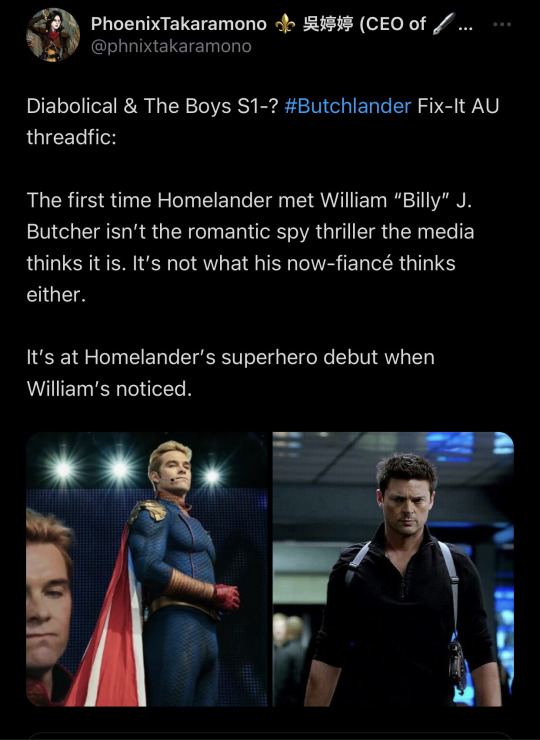
Initially I started this threadfic because I saw a tweet of someone saying how there were no Fix-Its in the 200+ Butchlander fics on AO3 (sorry, my mistake 🙏, someone has reminded me that there is at least one):
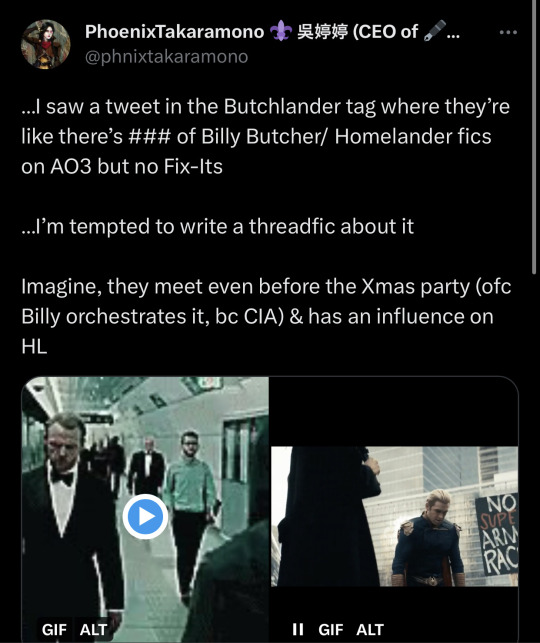
At the end of the day, I’m glad I was operating under an erroneous assumption because if I hadn’t, I wouldn’t have bothered writing this.
The way I’d envisioned it: we start with that Diabolical episode where Homelander had just had his hero debut (~18 y/o), and that’s our future husbands’ first official Meet Cute (/j). Billy, at this juncture, is a young CIA operative (~23 y/o) but he has not met Becca yet. It’s essentially a honeypot/ honeytrap operation—but without the seduction at least not from Billy’s POV; the readers voted for the yandere speedrun option with Homelander planting cameras in Billy’s flat at the Flatiron, haha, so obviously certain things will follow because of that chosen route. It also allows us an opportunity to play with HL’s past as a lab-rat (I’m playing with the possibilities), and have that affect the threadfic.
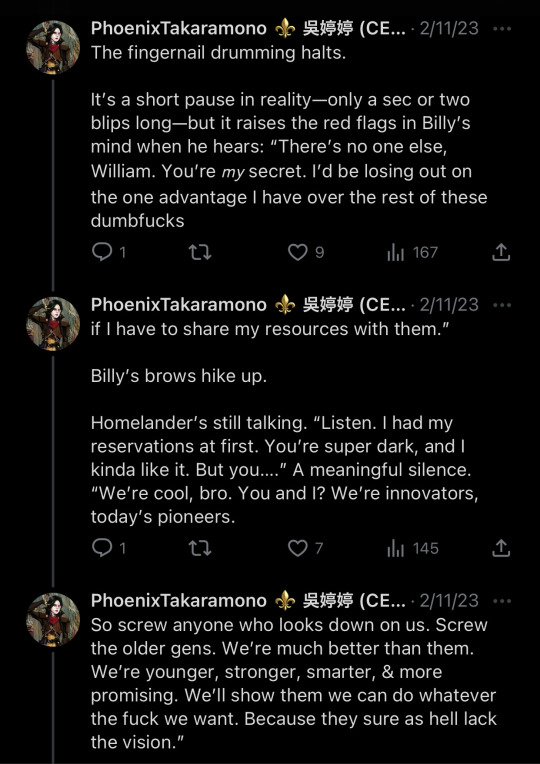
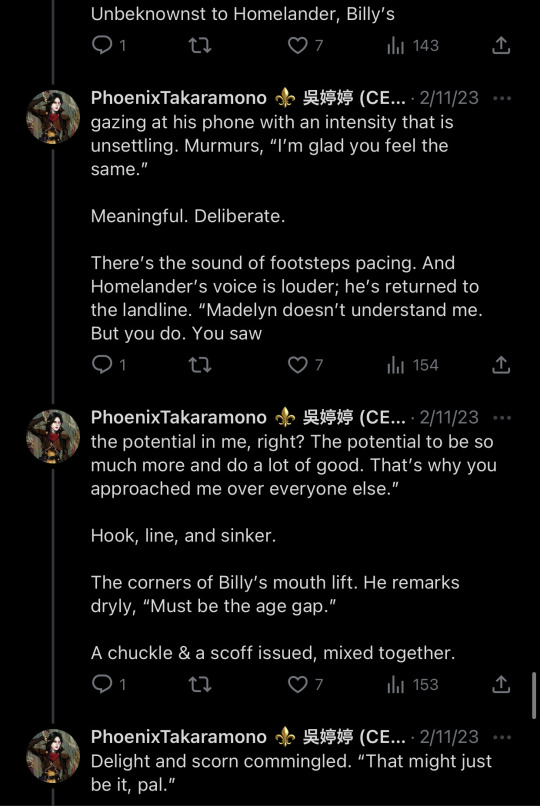
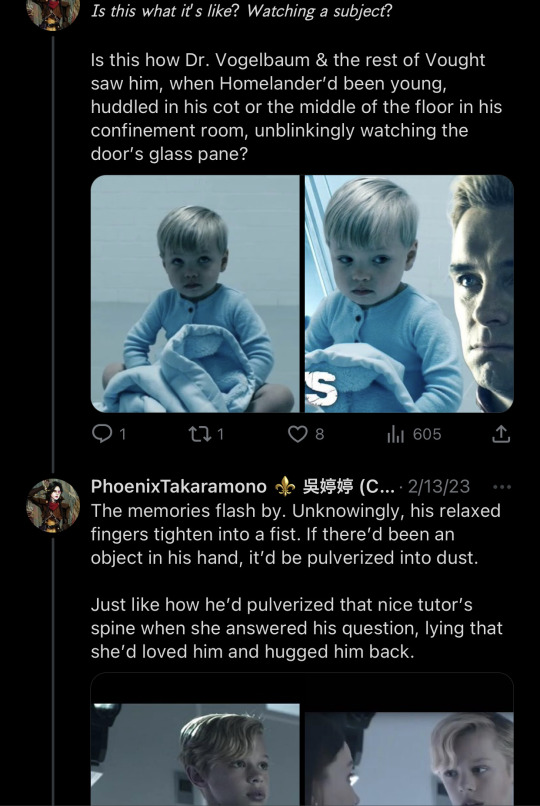
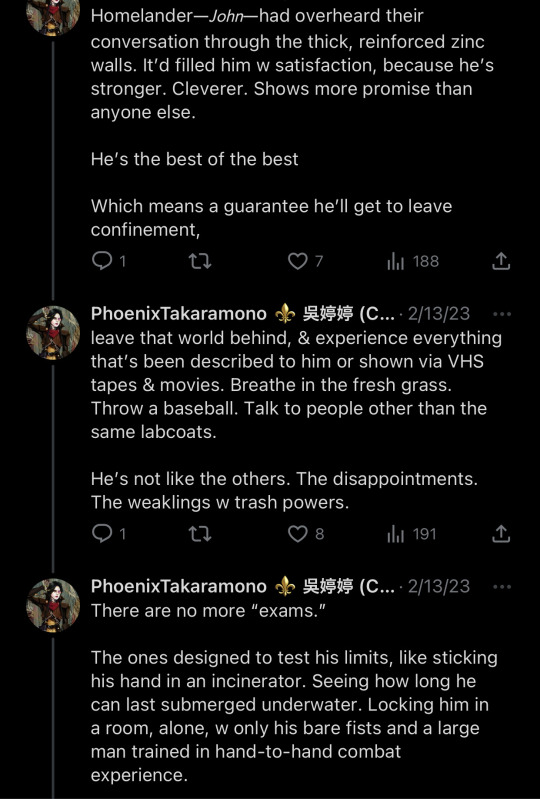
We then tie in the more important The Boys canon comic events and events from the TV version—and “fix” a couple of the more pivotal disastrous f*ck-ups such as the Cruz Chemical incident (animated show canon) and the crash of Transoceanic Flight 37 (TV canon), etc, with a couple original incidents if I’m feeling up to it.
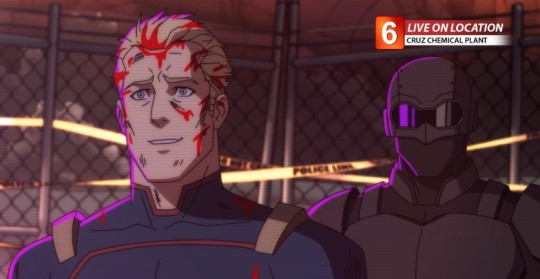
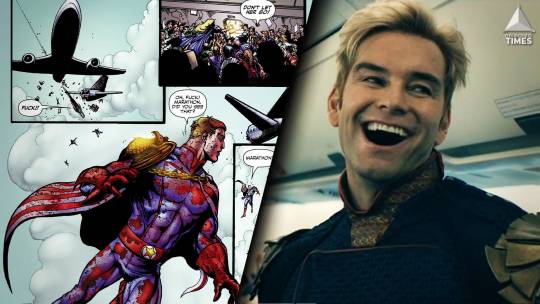
I love what you wrote about how HL’s not automatically made a better person just because he’s in love. Billy can steer him from his worst impulses to an extent. But at the end of the day, the idea is that whilst it is a Fix-It, and we are rewarding him with Billy as a boyfriend for his “good behavior” (later, so he gets his crush fulfilled), John as The Homelander is still not a very good man. I very much enjoy reading about a psycho narcissistic HL who has an obsessive crush, and I think a lot of people like reading that too. We have Billy as the hot older European young and bright CIA operative whomst HL wishes desperately to impress (gotta give it to a guy who’s infatuated). He one-sidedly envisions William Butcher as his partner-in-crime. William, in the threadfic, represents the CIA, a secret government intelligence agency that has the legitimacy Vought desperately wants—and so far only Homelander’s been given this opportunity. It’s a resource that only he has access to—and it makes him feel ✨special✨ —> William is special —> thus, William can only be his. Homelander doesn’t like to share (in this AU).
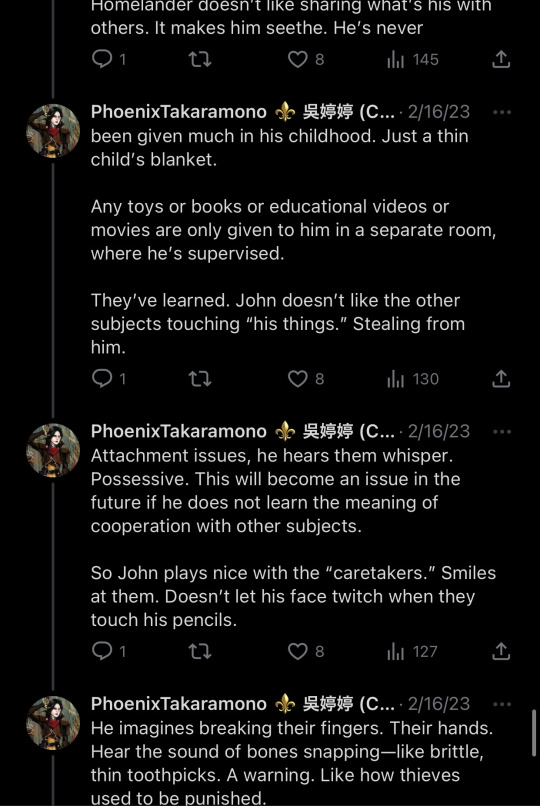
The silver lining is this HL, while still objectively awful, haha, is encouraged at his younger age to not be so reliant on Vought—and that impact will carry into his 20s, 30s, and 40s. We are essentially weaning our brainwashed murderous baby from sucking the teat of corporate.
#butchlander#the boys#the boys tv#billy butcher x homelander#homelander#billy butcher#Fix-It AU#ask#tocadoguara#ty for the ask! one more to go
23 notes
·
View notes
Note
Thinking about how Saeyoung only 'forgives' V in his after ending when he brings Saeran back (and even then not really, I think it's just the immediate shock of seeing Saeran again) and it made me wonder how he would feel about V after the SEs.
The last time they saw each other, the only thing holding Saeyoung back from physically hurting V (more than he did) was his own injuries - and not wanting to upset MC. Then, everything happens at Mint Eye and suddenly V is dead and Saeyoung seems to have let go of all of his anger.
Is it the same scenario as in V's AE, where the initial shock of grief over losing V makes his anger recede a little? Or is dying the thing that redeems V from what he has done?
I think that's an interesting question. I don't think I've ever thought hard about that before due to the immense hatred I know is inside of Saeyoung's hatred. We don't really see his reaction to V's death in the After Ending because he wasn't conscious when it happened. He has to be told AFTER the fact about what happened, by either one of the parties that witnessed it. I don't know who told him.
Jumin is one of those options, as is his MC, Vanderwood, or Jaehee. Saeran isn't going to bring it up. He's traumatized by what he's done to V. He didn't intend to shoot anyone that day. He was caged like an animal and reacted as such, his entire worldview crushed the second Rika admitted she never wanted him for Mint Eye, she wanted to use Saeyoung. Rika could've just as easily died that day as V.
So, I doubt anyone is going to bring that up around him. Neither is he going to bring it up. But, I have my opinions about SE Saeran that are not what you asked so I won't get into that.
This is about Saeyoung and his feelings. His feelings that never seem to change no matter what ending it is when he learns the truth of his life... and the lives of those around him. He hates them. He hates the lot of them for lying and using him... and Saeran. They were children. Children who needed help. They were played for fools like a fiddle in the devil's hand, and it's been years since Saeran was pulled into the lawless cult.
Saeran was tortured for YEARS.
It's not just the year that happens in Another Story. It's almost three years of absolute madness for Saeran. Saeyoung doesn't even get to know all the details of what happened, all he knows is Saeran had lost his mind in Mint Eye and was willing to do things he never would've as a child because of the brainwashing and cult manipulation in Mint Eye. That adds to Saeyoung's anger tenfold.
Think about how he feels in his Route when the truth comes out and he confronts V for the first time after Saeran gets kidnapped by the agency and Vanderwood.




Do you know why he mentions that V is the reason why he was put into the Agency? It was V who did that. V meet someone from that agency at an art auction and was talked into getting some help that way for Saeyoung. He thought it was like the "movies."
That's what he admits in a call with you during Saeran's After Ending. He was a young adult helping another child, but that doesn't excuse what he did. He was clueless. He didn't think harder about it. He just took that route because he thought it was for the best since he was afraid to ask anyone else for help (I.E. Jumin).
He damned Saeyoung to years of trauma that we're never going to know the extent of. We only see bits and pieces of what happened during his time in the agency because Saeyoung won't talk about it normally. The most we know is horrific, though. He spent days in a hot building thinking he was going to die by someone's hand or from the lack of food and water in that place. He almost died there. There are probably more times than that.
But, that's not even what Saeyoung is angry about. He could excuse the torture he suffered. But, he won't excuse what happened to his twin brother when he signed his lie away knowing that he might be forced to go through Hell. It was worth it if it meant Saeran was the happiest and safest person he could be. But, it was all a lie. It was a damned lie.
Saeyoung only holds back during this conversation with V because you're there. He doesn't want you to see him kill V with his bare hands in broad daylight. But, God, if you weren't there... he might've done it. I can't promise he wouldn't have done it. The anger is inside of him all the time and it won't leave. He wants everyone to suffer for what his brother went through. All of them.
I don't think he's over his anger in the latter half of the Secret Ending. He's bottling it up because Saeran is more important. The safety of his brother is more important to him than his anger. V is dead, he got what he deserved, he's angry he couldn't do that himself, but now he needs to protect Saeran from their father. He's fixated on that for a reason. If Saejoong found Saeran in the hospital, they'd be fucked in more ways than one.
He doesn't have time to fester on Jihyun Kim. V is dead. V is gone. He is in hell. That's what Saeyoung believes. He has to protect Saeran at all costs right now, and once he knows that Saeran is safe, I have no doubt in my mind he's going to have a crisis about that. How can he contend with that truth? Not that V is dead, but the fact that Saeran is guilty.
He has to come to terms with the fact that Saeran killed V, accident or not. He will be in denial about that. It's going to be complicated as hell.
If we see him shed any sorrow for V, I'm sorry, but it's a mask for the sheer fact that Zen and Yoosung don't know the truth. That's it. He's not in a position to talk about the truth. The RFA doesn't know all the facts. Only half of them do. V isn't redeemed for him, his anger at V doesn't decrease, we're just not seeing it because he's prioritizing his brother's safety right now.
I don't think it's anything like V's After Ending. I just genuinely think he's wearing a mask again and it's only a matter of time before you've got to talk to him about this because it's only going to fester inside of him. He needs to talk about this stuff. I hate that for him because he needs to have a healthy outlet but... it's Saeyoung. Old habits just die hard for him and he needs more time to focus on himself.
How does he confront Saeran's actions?
How does he let go of his shame over not being the one to do it?
How does he see the world knowing that he might never have all the answers he needed?
How does he face everything?
Saeyoung hates V, and he always will. But, the sad thing is that he'll never get any solid closure about it. I just hope he gets to talk about it with someone in a healthy outlet.
#ask#mod kait#mystic messenger#mysme#brighteststar707#mm#mysticmessenger#saeyoung choi#choi saeyoung#luciel choi#choi luciel#seven#707#seven mystic messenger#seven mysme#seven mm#mm seven#mysme seven#mystic messenger seven#character analysis
32 notes
·
View notes
Text
[Analysis] Pearl Appreciation (Steven Universe)
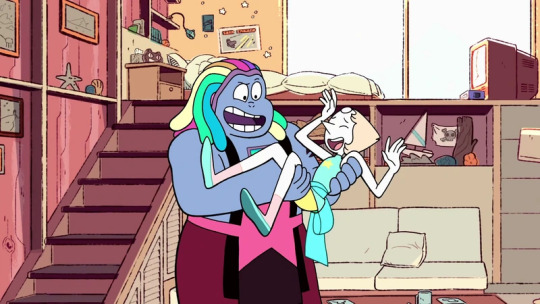
Source: https://steven-universe.fandom.com/wiki/The_Reef
By: Peggy Sue Wood | @pswediting
I must admit that when Steven Universe (SU) was airing, I wasn't a fan of the show. However, I did watch the series at random intervals due to my friend group being largely obsessed with it. As many friends moved on from the series, I continued to check back in because of my favorite character from the show, Pearl. The Pearl we knew long before Blue Diamond’s Pearl and Yellow Diamond’s Pearl appeared or even the original Pink Diamond’s Pearl (now called Volleyball) joined the cast.
Despite her cold color palette and sharp edges, Pearl had a warm and motherly demeanor that was endearing to me. I liked that they said things that were sometimes wrong, but they were always confident in their words.
What truly stood out was Pearl's moments of grief and guilt, which were a result of their complex relationship with Pink Diamond/Rose Quartz (Rose). Pearl was privy to many of Rose's secrets, and her devotion was completely intertwined with Rose's influence. This was evident throughout the show, and Pearl's desire for freedom and independence often reflected Rose's own wants and desires rather than appearing as though it was their own wish.
Pearl’s whole inspiration is Rose, and their devotion is entirely engrained with Rose’s influence, this becomes more and more evident as we see flashbacks of Pearl and Rose's relationship in the series wherein Pearl still aligns themself to what they think Rose wants them to want over time. In a reflection of the earlier seasons, Pearl’s want for freedom and maintenance of independence is often just an expansion of Rose’s wants and desires going so far as to repeat Rose's words to themself in a rehearsed way. This likely stems not just from Pearl's affection toward Rose, but from having been born into a society of slavery and brainwashing. As a result, I feel that Pearl had the hardest time adjusting to the pressure and freedom of life on Earth, at least when compared to Garnet and Amethyst.
Garnet embodied the freedom that Rose wanted for gems. Garnet has let go of Home World, merged with another gem, and founded a peaceful existence on Earth. While Garnet grieves the passing of Rose as a friend, their self-identity is not defined by Rose as we see when Sapphire and Ruby are able to reflect and rejoin. And Amethyst, being younger, never knew the oppression of Home World, therefore can only understand from an outside perspective what Pearl, Garnet, and Rose have seen or experienced as gems who escaped from an oppressive society to find refuge on Earth. Losing Rose–while painful–is not nearly the same for Amethyst as it is for Garnet (by extension, Ruby and Sapphire) or Pearl.
So while Garnet and Amethyst are dealing with the loss of a close friend and family member, Pearl is dealing with the loss of her reason for being. Sure, Pearl was "free" under Rose, but she was maintaining her status as a servant or slave under Rose. The series did try to combat this by having Pearl "chose" to follow Rose, but–realistically–what other options did Pearl have? It was either return to Home World and become the slave to another gem (if not being poofed/destroyed) or follow their new, kinder master into an unknown, but less oppressive lifestyle.
Unlike Rubies or Sapphires, whose roles had their own levels and advancements within the system of oppression, a Pearls' station on Home World and other Gem-run planets had nothing to do with their achievements. Their existence was purely for the convenience and pleasure of other gems. It was to the extent that Pearls, from what I understand in seeing the show, were forced to take on a specific shape/figure and attire chosen by their owners, unlike the other gems who could choose, to some extent, a form of self-identity in the form they take when reforming from the gem-state (Steven Universe Future, Episode 4 “Volleyball”).
It is these underlying pressures that really drew me to the character, even before we learned about all these details surrounding Pearl's character. I felt like it was clear that this kind of story was intentional and meant to come out at some point since Pearl always seemed to take Rose’s death harder than the others, and it never felt to me like the only reason for that was an unrequited love. I think that a very telling scene leading up to this feeling is when Pearl meets Lion for the first time and ends up running away:
youtube
Title: “Steven Universe | Rose’s Scabbard – Steven Comforts Pearl | Cartoon Network” | Source: https://www.youtube.com/watch?v=Z34V-pHgLRE&ab_channel=StevenUniverse
In the scene where Pearl meets Lion, they are destroyed emotionally at the idea that something about Rose is hidden from them, because they likely didn't have any secrets from Rose and because it seems to betray that idea of Rose trusting Pearl. Pearl's outburst from grief speaks a lot to their trauma and relationship with Rose. Amethyst gets upset but doesn’t follow and most likely does not really understand the depth of pain Pearl has suffered. Meanwhile, Garnet remains silent at Pearl's outburst, probably understanding that Pearl suffered a lot more as a gem with a significantly lower status when they lived on Home World but not knowing that Pearl had been Rose's, a Diamond's, pearl.
In the minutes following the outburst, we get to see how Pearl's character is a form of devotion to Rose's chosen path for her, rather than an independent choice or path Pearl came up with or joined after hearing about other gems wishing for freedom. It was Rose's idea, and Pearl, her Pearl ("my Pearl"), followed.
Amythest, again, can't really understand the difference in how Pearl views the loss. Garnet, while empathetic towards Pearl, is understanding that there is a difference in the feelings of loss because Pearl's different experience from their former lives on Home World, but also can't fully experience the depth of Pearl's pain because–unlike Pearl–Garnet was truly free of the Diamonds and their dictatorship while Pearl was still living directly under one and keeping that Diamond's secret.
It’s why I think Garnet remains so much more grounded in reality than Pearl–such as when Steven is born and Garnet accepts that Rose is gone, while Pearl can’t stop crying. They’re at two very different stages in the grieving process (Season 4, Episode "Three Gems and a Baby"). At times, this means that Garnet comes off a little cold to Pearl. Maybe not from the audience's perspective as viewers see Rose's passing as having been a long time ago by this point, but from a gem's perspective, it has only been, like, a few months or days even since the loss. Remember, that Pearl has been with Rose for more than 5,000 years, so 10-20 years with Steven is an incredibly short period of time for what is, essentially, an immortal life. That's not even taking into account that during those 5,000 years, Pearl really didn’t fully explore their freedom since Pearl spent it at Rose’s side, walking the line of what is permissible by Rose and what isn’t in terms of boundaries–unlike Garnet did who has had the chance to grow up apart from Rose, the Diamonds, and other parts of gem society.
youtube
Title: “Steven Universe | Rainbow Quartz | Rose and Pearl Fuse | We Need to Talk | Cartoon Network” | Source: https://www.youtube.com/watch?v=6OfY0NOXunQ&ab_channel=StevenUniverse
I think a scene that speaks to this idea of Pearl never being free until Rose's passing comes from Season 2, Episode 9, "We Need To Talk," wherein Rose and Pearl fuse.
Rose, as a Diamond, and as the leader seemed to abuse Pearl without meaning to simply by stringing them along. Remember that fusing is a deeply personal experience for the gems. On Home World, it is a heavily regulated act and as Garnet, as well as Sapphire and Ruby, show and tells us, it is not a process to be taken lightly. While Pearl may have instigated the above scene where the two fuse, Rose is the one using Pearl here. Rose is doing so to entertain Greg, while Pearl is trying to show how close they are and disuade Greg from getting closer. When the two gems separate again, Rose’s focus is on Greg, and Pearl is clearly jealous and unhappy, trying to then tell Greg that he'll never be as close as they are.
We know that this is even more personal for Pearl, as she fantasizes about a relationship with Rose that Rose has fully encouraged, as seen here:
youtube
Title: “Steven Universe | Pearl fuses with Rose Quartz | Now We’re Only Falling Apart | Cartoon Network” | Source: https://www.youtube.com/watch?v=0q2ZwnkGBSQ&t=83s&ab_channel=StevenUniverse
I thought about this a lot in the earlier seasons, and I realized that it’s not until Steven is beginning to enter his teens that Pearl really begins to assert themself fully as a separate, independent, and free being--likely because Steven is no longer as reliant on them for care. The "Back to the Barn" episode is a great example of this as we learn about Pearl’s former life as a gem-slave. It’s also a great episode because it’s them asserting themselves and finding themselves again after losing Rose and realizing that Steven won’t rely on them forever.
It sparks, in my mind, the journey that Pearl's character has to make is one that reflects on their grief, allows them to overcome trauma, and particularly one that allows them the attempt to overcome a secret trauma without anyone knowing. It is what made Pearl's story much more compelling to me from a character's storytelling perspective, as Pearl must first overcome their grief and then find a new definition of identity and path based on their own wants, needs, and desires–something the other main-cast gems developed years ago.
It is also why I liked later seasons where Pearl is shown to be moving forward in the grieving process beyond the state of reliving Rose’s death over and over (which, they seemed to be doing via reenactments during self-isolation away from the other gems and Steven).
This development really showed itself in “Mr. Greg“ (Season 3), when Pearl sang “It’s Over, Isn’t It?” and by Steven Universe Future, Pearl’s character arc enters a state of healing–both from the grief of losing Rose and from the suffering they had undergone as a Pearl in the formerly oppressive gem society.
Is Pearl completely healed? Probably not. I mean, again--they are very old and it has not been that long for them. However, they are, at the very least, free of the shackles and dealing with the pain, as noted in Pearl’s Song, featured in Steven Universe Future, "Happily Ever After."
That’s my appreciation for Pearl, y’all. Thanks for reading. Oh, and #Bispearl because I ship it.
youtube
Title: Pearl's Story - Happily Ever After | Steven Universe (HD 4K) | Source: https://www.youtube.com/watch?v=jtorJzBYRDY&ab_channel=LazuliBoy
46 notes
·
View notes
Text

OSLO COPPERHEAD (jacob elordi fc) the odds are in your favor! Please report to your nearest Capitol Agent to be prepped for the 74th Annual Hunger Games!
ooc
Alias/Age/Pronouns/Timezone: Mikey, 22, They/Them, MST
Triggers: [REDACTED]
If you had to describe your muse as a canon Hunger Games character, or mix, who would you compare them to and why? Oslo has a lot of influences! The main three would be Haymitch, Effie, and Tigris. These are wildly different characters, you say– I know!! I find Oslo similar to Haymitch in the sense that he’s been an escort for four years now and the death of his tributes has begun to weigh heavily on him and he turns to alcohol and partying within the Capitols walls to sort of numb that. I do think he is a bit of Effie in the sense he’s an escort and excited to show the tributes the Capitol, wanting them to see the beauty in that. I threw Tigris in this mix too simply because of his close relation to the president yet simultaneous qualms with the games.
Anything else? N/A
basics
[JACOB ELORDI, CIS MAN, HE/HIM] The 74th Annual Hunger Games are upon us and here comes OSLO COPPERHEAD, the DISTRICT 1 ESCORT and PRESIDENT’S NEPHEW NEPO BABY. Word around The Capitol is that they’re WELL-MANNERED and INTELLIGENT but can also be ANGRY and IGNORANT. According to sources, they’re 22 and were once described as being seen and not heard, tabloid headlines, believing in kindness, inferiority complexes, and brainwashing. What a character! As we always say, may the odds be ever in their favor!
biography
Oslo’s parents were never important people. The extent of their importance was their relationship to the president, who did the real work, rising from the ashes of the rebellion to restore order to all of Panem. Oslo’s father, Romulus, was far younger than Calpurnius, and was perfectly content riding his big brother’s coattails. He married a beautiful bride, capitol citizen, of course, and enjoyed their lives gliding from event to event. Oslo was born second, doted over by his older brother and the maids who were around far more often than their parents. Oslo struggled as a boy in rooms full of adults. He’d stand on chairs and yelp with excitement to share only to be hushed by the cold gaze of his uncle at the end of the table. Yes, in the Capitol, the world was full of options for him, but only after he’d gone through his schooling.
Oslo actually quite liked his education, history and literature being his favorites. However, there was a problem. Oslo and his brother weren’t quite as far apart in age as their Father and Uncle, so they went through school side by side. If Oslo were to get an exemplary mark, his brother’s was higher. If Oslo showed promise, the eldest showed more. If Oslo ran for any positions of power, he’d been beat out to a vicely position under his older brother. He didn’t blame his brother by any means, but it did irritate him. Through finishing school, primary education, important political dinners, Oslo never shined in comparison. It built resentment, this goal to achieve more than he ever had. Oslo was an intelligent boy, really, going onto higher education within the Capitol. But he was prone to fits of anger, unprofessionalism. Among the gilded halls of the Capitol, his outbursts of erraticism, weren’t always welcomed. Their Uncle favored his brother, what was he supposed to do when not even the President of Panem had enough faith in him to take him under his wing.
This didn’t mean being the Nephew of the President came without perks though. Despite a close eye constantly on what tabloids had coined, “The Presidential Family.” the general public didn’t know their inner workings. Oslo skyrocketed to the vip list of every restaurant, club, party, and bar. Random citizens adored him despite his ruggedness. The headlines about his rowdy nights out or less than regal behavior around the city didn’t deter his most loyal followers. His parents, brother, and naturally Uncle had plenty to say about this. When Oslo officially finished his education at eighteen, he had dreams of going on a charity tour in the districts, but was forbade from going. Instead, Uncle Cal gave Oslo his pick of the litter– Which tributes did he want to escort through the games?
District One seemed like the obvious choice for Oslo. Often, those were career tributes, and if Os had done his math correctly, they were statistically less likely to die. He could save himself the guilt of watching them die year after year. Unfortunately, math didn’t factor in human emotion, and when he lost his first two tributes at age eighteen during the 70th games, he only spiraled further. Sure, he could clap his hands and have anything he wanted, yet Oslo chose to get obliterated amongst Capitol elite, sometimes tributes, and swallow his grief. Those were the sentiments of a rebel sympathizer and he was loyal to the Capitol– to his family. Oslo, sadly, was unable to abandon angry outbursts in his youth.
Desdemona Herion was Oslo’s closest ally. They had grown up close, even dated for a time before Oslo’s sexuality revealed itself. They remained attached at the hip after that, but it wasn’t a guarantee Des would be available following every shortcoming and humiliation Oslo endured. Still, she understood his burden. As a stylist, she lost tributes year after year too, and it only galvanized their bond. Around the games every year, headlines would flare up around Oslo’s name, he’d ignore them, and carry on distracting himself from the horrors by every mean possible.
As proper as Oslo knows how to be, this year he’s been fighting apathy towards the games. District One’s Tributes look as promising as they do every year, and while it would be much easier to shut down and prevent the pain of loss, he also wants to show them the glory of the Capitol to it’s fullest extent before they may leave him.
writing sample
[REDACTED]
stats
Deceive- 2Fight- 2Lore (knowledge)- 3Notice - 1Physique - 3Provoke - 1Rapport - 2Resourcefulness - 1Stealth - 1Will - 3
extras
PINTEREST / PLAYLIST
#accepted#the hunger games#the hunger games rp#the hunger games roleplay#the hunger games rpg#hunger games#hunger games rp#hunger games roleplay#hunger games rpg#thg rp#thg roleplay#thg rpg#oc rp#mumu rp#dystopian rp#diverse rp#new rp#lit rp#oslo
1 note
·
View note
Text
I am an older millennial who grew up in a politically conservative military family. My mother has always been openly contemptuous of the femininity her mother tried to force on her, so even though I had literally zero exposure to out trans or nb folks until I was well into adulthood, I had a strong model for a sort of gnc way of being a woman from the moment I was born. I was, to a great extent, allowed to opt in or out of femininity in a way that I absolutely would not have been had I been AMAB.
(Note that this is fairly common in conservative families--girls are frequently rewarded for learning masc-coded skills, because that shows power and courage and independence. My dad was disappointed when neither me nor my sister wanted to go hunting with him.)
It took me an embarrassingly long time to come to terms with the existence of trans men. Trans women made sense to me, because women can have the hobbies they want, wear what they want, express themselves how they want. And, yeah, it pisses off a lot of people when women do those things, and there are extreme repercussions baked into being a woman (much less a trans woman), but dealing with misogynistic bullshit is part of the deal.
As I understood it, being a boy meant the world demanded that you had to keep your hair short and put limits on the kinds of clothes you could wear and the colors you were allowed to like and the characters you were allowed to play on the playground, and stepping outside those boxes would get you punished. Being a girl meant that the people who weren't misogynistic assholes would be fine with you having a buzz cut and wearing work boots and no makeup. Trans women made sense to me, because patriarchy made the "Man" category incredibly limiting; trans men didn't make sense to me because the "Woman" category already accommodated masc presentation.
At some point, after years of troubling over this issue in an attempt to understand people who I wanted to support completely and unquestioningly, it finally clicked for me what I was stumbling over: I have absolutely no internal sense of gender, and I honestly did not understand that other people do. "Girl" and "boy" for me and my feminism were 100% defined around how an individual presented themself and how society perceived and reacted to that presentation. So the idea of being a trans man only made sense under this misunderstood schema as a loss of options of what to wear and how to style oneself. The realization that THAT WAS TRULY NEVER WHAT ANY OF THIS WAS ABOUT, that other people have inherent senses of gender totally outside of socialization, took me all the way out and ultimately completely changed my world view.
Maybe if I had gotten an autism diagnosis as a child and had that understanding and that community to help me figure out social dynamics as a kid, I might have seen earlier how the rules and categories I was working out for myself were things other people didn't have to work out because they knew. And probably instead of accepting that I was a girl because I was told I was a girl and nothing about me made "girl" feel wrong because of what I thought we all knew "girl" meant, I would be one of those poor, confused autistic enbies that the TERFs need to save from our debilitating misconceptions of the world.
So honestly this all is to say that, in addition to all of the excellent commentary above about resisting arbitrary categorization, it cuts the other way, too. I think the percentage of autistic people who identify as nb is probably rising because we have access to so much more information about how other people experience their gender, and those of us who learned to mask early are unlearning the brainwashing.
ETA: It bears saying explicitly, even though I hope it is understood, that trans men are amazing and valid and not mysterious confused beings to be puzzled out. Figure out your own shit and stop being weird about other people's identities.
terfs keep mentioning the % of autistics who are trans/nb and that we're 'brainwashed'
and because i'm an asshole, i decided to look into why so many autistic folks are trans/nb. it's not an inaccurate statement, at least the first half, but terfs lie through their teeth so i decided to get to the scientific root of it.
the answer blew my fucking mind.
the study on gender and autism i found said two very specific things about autistic people: we are more mentally resistant to things like social conditioning and binarism. we like our secret third things, y'know.
an excerpt:
“The finding that non-binary identities are most elevated seems to support hypotheses focussed on autistic resistance to social conditioning, which are consistent with existing evidence of the same effect with respect to self-description of sexual orientation. Perhaps elevated rates of trans identity in autism might result from a rejection of the binary cisgenderist norm, which combined with a below-typical concern for social norms could promote the disclosure of the identity.”
94% of autistics surveyed for that paper identified themselves as non-binary.
other studies have found autistic people have higher levels of critical thinking, and require more evidence to maintain or convert to a belief system (hence why many of us eventually fall away from religion) than allistic people.
which means, at least from my perspective, that:
a) the 'brainwashing' terfs are accusing the trans community of inflicting on autistic folks would likely not even work if they tried.
b) the current binary definition of gender flies directly against embedded autistic modes of thinking to begin with.
you cannot brainwash someone into thinking something they already believe.
#no one asked you ms p#autistic things#i still id as a 'cis lady person'#but my only internal gender feelings are that I am definitely not a man but the word 'woman' feels wrong#I'm gender agnostic i guess#and my body is unmistakably unavoidably female so [shrug] whatever
28K notes
·
View notes
Text
Building an Embodiment of the Fairytale Princess in Dnd 5e
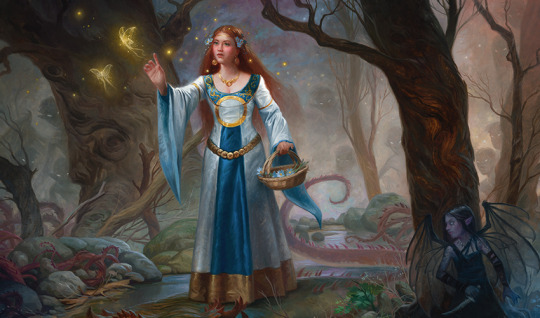
No matter who you are, when someone mentions fairytales, we all think of the stock characters. You’ve got your beloved princess, your charming prince, and your tempting witch, with maybe a malicious dragon thrown in for flavor. And that’s what we’re looking to build today. Not any specific princess, but rather an amalgomation of every fairytale princess and princess trope in one character.
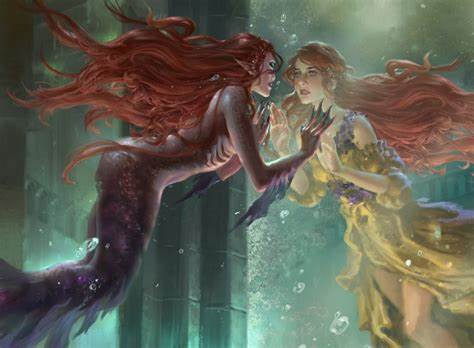
For race, we’ll go with a human, or to be more specific a variant human. We were blessed by fairies since birth, and they gave us the gift of magic. The fairies gave you magical beauty and grace for +1 CHA and +1 DEX, as well as the gift of song for Performance for your fey-blessed skill. Tasha’s introduced the new feature Fey-Touched which gives our princess +1 CHA, the spell Misty Step, and one other 1st level divination or enchantment spell from any spell list. Charm Person, Command, and Sleep are all fine options.
For alignment, we’re practically a saint, so we’re lawful good.
And for background we’re a pretty obvious Noble for Persuasion and History.
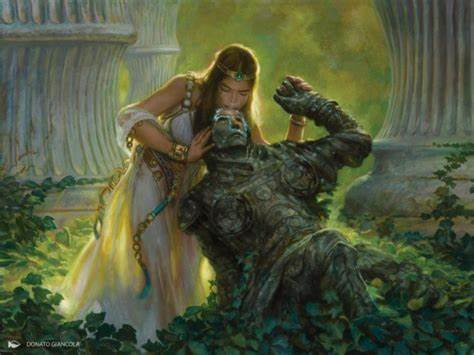
To be a classic fairytale princess, we’re going to need to be able to sing, summon critters to do our chores, and have a fairy godmother who watches over us. The best way to do all three is to be a Bard and an Archfey Warlock. However, in order to use the Bard to their full extent, the Bard has to reach level 18 to get all of their bardic secrets. Luckily, everything we need from the Warlock can be gotten in the first two levels. All we need from Warlock are the spells Eldritch Blast, Mage Hand, Armor of Agathys, Charm Person, and Unseen Servant. Then we get two eldritch invocations, we’ll pick up Beast Speech so we can talk to animals permanently and agonizing blast to make our eldritch blast a more effective cantrip.
For this build, Charisma is our top priority. We’ll want a good Constitution to maintain concentration spells, a good Dexterity since all we’re wearing is a set of clothes (fine), and a good Wisdom score primarily for the use of Animal Handling. Strength and Intelligence will get dumped. We’ll be sure to take up expertise with Animal Handling, Persuasion, Performance, and Religion, because you’re a good medieval girl who eats all her vegetables and goes to bed on time.
Fairytale-Based Spells
Basic Fairies
Dancing Lights: they’re called fairy lights for a reason. Faerie Fire: faerie lights that help you keep track of foes. Healing Spirit: a nature spirit with a fey appearance that heals your party. Spirit Guardians: They can take on a fey appearance, dealing radiant damage Conjure Woodland Beings: You summon fey creatures to help you fight. Conjure Fey: you summon a greater fey to help you fight
Snow White
Armor of Agathys: Surround yourself in a barrier of ice when injured. Reflavor as Snow White’s glass coffin.
Cinderella
True Polymorph: the fairygodmother turned mice into horses and a pumpkin into a carriage. Wish: everything the fairygodmother did was to make Cinderella’s wish come true.
Sleeping Beauty
Dawn: a loose connection, but one of sleeping beauty’s names is Aurora or Dawn. Dream: useful for when you’re asleep and need to call someone to save you. Wall of Thorns: to keep the princess safe, the fairies raised a ticket of thorns around the castle, which only parted for the handsome prince.
The Little Mermaid
Suggestion: Mermaids have hypnotic voices that lure men to their deaths. Tidal Wave: Mermaids control the tides and waves Mass Suggestion: How to brainwash an entire ship crew. Control Weather: Mermaids were blamed for violent sea storms. Tsunami: Like tidal wave, just bigger and more destructive.
Beauty and the Beast
Unseen Servant: In the original story, the beast’s servants were invisible. Tiny Servant: to bring a tiny object to life, like the Disney version. Animate Objects: make the room attack someone, like the Disney version. Charm Monster: beauty soothes the savage beast.
Rapunzel
Rope Trick: You create a safe pocket dimension that can only be reached by climbing. Galder’s Tower: create a two story tower. Reminiscent of Rapunzel’s Tower.
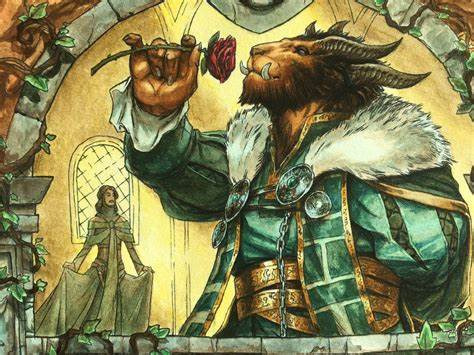
Race: Variant Human Background: Noble Alignment: Lawful Good Class: Glamour Bard (18) Archfey Warlock (2) Base Stats: Strength: 8 (-1) Dexterity: 14 (+2) Constitution: 16 (+3) Intelligence: 10 (0) Wisdom: 14 (+2) Charisma: 20 (+5) Saving Throws: Strength: -1 Dexterity: +8 Constitution: +3 Intelligence: 0 Wisdom: +2 Charisma: +11 Combat Stats: HP: 163 AC: 13 Speed: 30 Initiative: +2 Proficiency Bonus: +6 Passive Perception: 18 Dark Vision: 0 feet Proficiencies and Expertise: Animal Handling (+14) History (+6) Perception (+8) Performance (+17) Persuasion (+17) Religion (+12)
Spell Slots
1st (6) 2nd (3) 3rd (3) 4th (3) 5th (3) 6th (1) 7th (1) 8th (1) 9th (1)
Fairytale Spellbook
C Dancing Lights, Eldritch Blast, Friends, Light, Mage Hand, Mending 1 Armor of Agathys, Charm Person, Command, Faerie Fire, Healing Word, Sleep, Unseen Servant 2 Animal Messenger, Enlarge/Reduce, Enthrall, Healing Spirit, Misty Step, Suggestion 3 Conjure Animals, Mass Healing Word, Spirit Guardians, Tiny Servant 4 Charm Monster, Conjure Woodland Beings 5 Animate Objects, Dream 6 Mass Suggestion, Wall of Thorns 7 Mord’s Magnificent Mansion 8 Glibness 9 True Polymorph, Wish
Actions:
Countercharm. Creatures within 30 feet get advantage against being charmed or frightened following a performance check.
Bonus Actions:
Bardic Inspiration. Add 1d12 to an ally’s d20 roll 5 times per long rest.
Features:
Eldritch Invocations. Agonizing Blast. Add your Charisma mod to your Eldritch Blast damage rolls. Beast Speech. Cast Speak with Animals without using a spell slot. Enthralling Performance. Up to 5 creatures must make a DC 19 WIS saving throw or become charmed by you. Fey Presence. Creatures within 10 feet make a DC 19 WIS saving throw or become charmed or frightened by you until the end of your next turn. Font of Inspiration. Regain all uses of Bardic Inspiration on a rest. Jack of All Trades. Add +3 to skill checks you’re not proficient in. Magic Initiate. Choose two cantrips and a 1st level spell from the cleric spell list. Mantle of Inspiration. As a bonus action, give up to 5 creatures within 60 feet 14 temp HP points, and they can move without provoking an opportunity attack. Position of Privilege. You are welcome in high society, common folk go out of their way to accommodate you, and you can get an audience with other nobles. Song of Rest. Regain 1d12 extra HP on a short rest after singing. Unbreakable Majesty. Take on a majestic appearance for 1 minute, the first creature to target you each turn must succeed on a DC 19 Charisma saving throw or choose another target. If it succeeds, it has disadvantage on saving throws against your spell DC next turn. Use once per long rest.
Fairytale-Based Items
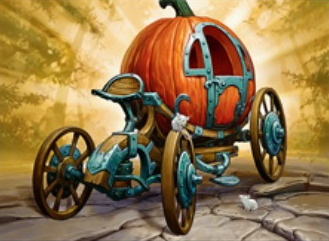
Pumpkin Carriage (Cinderella)
Common Wondrous Item - Vehicle
Weight: 600
This vehicle ignores difficult terrain.
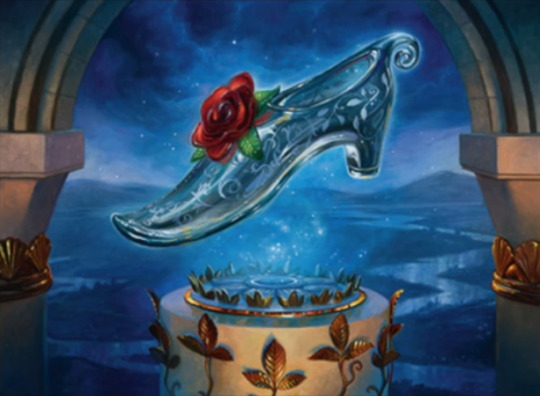
Glass Slippers (Cinderella)
Rare Wondrous Item - Attunement Required
Your movement speed isn’t slowed by difficult terrain, and spells and other magical effects can’t reduce your speed. However, you cannot cross terrain that would harm you, such as lava. Because the shoes fit only one person in the entire kingdom, this item requires attunement.
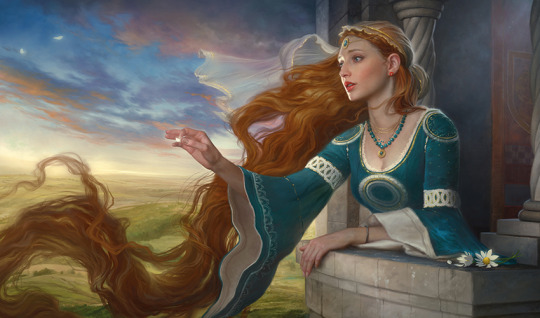
Golden Stair (Rapunzel)
Rare Wondrous Item - Attunement Required
Your long hair can be used as a Rope, Hempen and a Grappling Hook. It’s attached to your head, so it cannot be broken, stolen, lost, or used up. The hair can also be used like a lasso to bind and pull switches or objects weighing 10 lbs or less closer. It has a range of 60 feet. Because it is attached to your body, this item requires attunement.
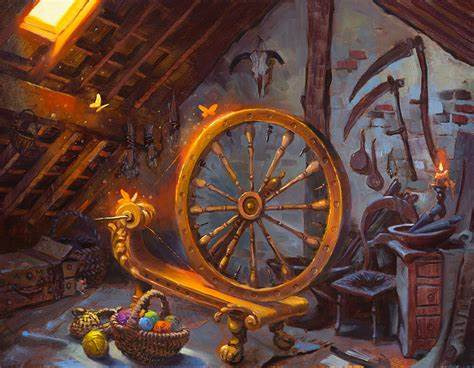
Sleeping Spindle (Sleeping Beauty)
Rare Weapon (Dagger)
This cursed spindle deals 1d4 piercing damage. When a creature is struck by this blade, they must succeed on a DC 15 Constitution saving throw or fall into a magical sleep for 24 hours. The curse can be broken by the spell Remove Curse. Once the curse has been used, it cannot be used again until the dawn of the next day.
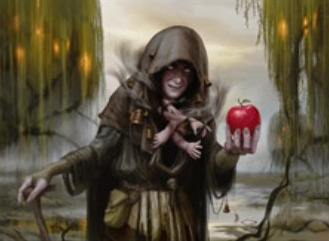
Poison Apple (Snow White)
Common Weapon (light, thrown)
When this item is thrown, deal 1d4 bludgeoning damage to any creature it hits. When this item hits a creature or a solid surface, it explodes, creating a poisonous cloud within 5 feet centered on where it landed. Creatures inside the area of the cloud take 1d4 poison damage and make a Constitution saving throw against DC 10 + your INT mod or become poisoned. Crafting: requires fresh fruit, a poisoner’s kit, and knowing at least one spell. Crafting takes 10 minutes.
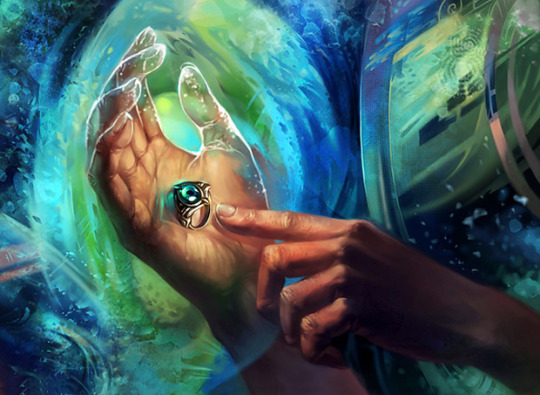
Ring of Teleportation (Beauty and the Beast)
Epic Ring - Attunement Required
Choose up to three locations you have been to before and know well. Once per day, turn the ring three times and you and any creature touching you will be teleported to whichever location you desired. You can change your three saved locations at any time, but you must be at the location to save it to the ring. The ring resets at dawn following its last use. Because the ring can only take you to places you’ve been before, the ring needs to be attuned to you.
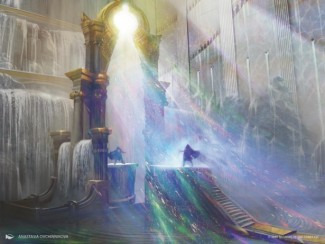
Magic Mirror (Beauty and the Beast/Snow White)
Legendary Wondrous Item
Once per day, choose one of the following:
Cast Scrying without using a spell slot. The mirror will show you what you ask to see.
Cast Legend Lore without using a spell slot. Ask the mirror a question and it will answer truthfully to the best of its ability.
#fairytale princess#disney princess#princess#dungeons and dragons#dnd#dnd 5e#dnd 5th edition#dnd fifth edition#fifth edition#d&d fifth edition#5th edition#d&d 5th edition#5e#bard#glamour bard#archfey warlock#fairytale#cinderella#snow white#Snow White and the Seven Dwarves#sleeping beauty#rapunzel#little mermaid#the little mermaid#beauty and the beast#disney#royal#royalty#fairy princess#fairy
5K notes
·
View notes
Text
Bakudeku: A Non-Comprehensive Dissection of the Exploitation of Working Bodies, the Murder of Annoying Children, and a Rivals-to-Lovers Complex
I. Bakudeku in Canon, And Why Anti’s Need to Calm the Fuck Down
II. Power is Power: the Brain-Melting Process of Normalization and Toxic Masculinity
III. How to Kill Middle Schoolers, and Why We Should
IV. Parallels in Abuse, EnemiesRivals-to-Lovers, and the Necessity of Redemption ft. ATLA’s Zuko
V. Give it to Me Straight. It’s Homophobic.
VI. Love in Perspective, from the East v. West
VII. Stuck in the Sludge, the Past, and Season One
Disclaimer
It needs to be said that there is definitely a place for disagreement, discourse, debate, and analysis: that is a sign of an active fandom that’s heavily invested, and not inherently a bad thing at all. Considering the amount of source material we do have (from the manga, to the anime, to the movies, to the light novels, to the official art), there are going to be warring interpretations, and that’s inevitable.
I started watching and reading MHA pretty recently, and just got into the fandom. I was weary for a reason, and honestly, based on what I’ve seen, I’m still weary now. I’ve seen a lot of anti posts, and these are basically my thoughts. This entire thing is in no way comprehensive, and it’s my own opinion, so take it with a grain of salt. If I wanted to be thorough about this, I would’ve included manga panels, excerpts from the light novel, shots from the anime, links to other posts/essays/metas that have inspired this, etc. but I’m tired and not about that life right now, so, this is what it is. This is poorly organized, but maybe I’ll return to fix it.
Let’s begin.
Bakudeku in Canon, And Why Anti’s Need to Calm the Fuck Down
There are a lot of different reasons, that can be trivial as you like, to ship or not to ship two (or more) characters. It could be based purely off of character design, proximity, aversion to another ship, or hypotheticals. And I do think that it’s totally valid if someone dislikes the ship or can’t get on board with his character because to them, it does come across as abuse, and the implications make them uncomfortable or, or it just feels unhealthy. If that is your takeaway, and you are going to stick to your guns, the more power to you.
But Bakudeku’s relationship has canonically progressed to the point where it’s not the emotionally (or physically) abusive clusterfuck some people portray it to be, and it’s cheap to assume that it would be, based off of their characterizations as middle schoolers. Izuku intentionally opens the story as a naive little kid who views the lens of the Hero society through rose colored glasses and arguably wants nothing more than assimilation into that society; Bakugou is a privileged little snot who embodies the worst and most hypocritical beliefs of this system. Both of them are intentionally proven wrong. Both are brainwashed, as many little children are, by the propaganda and societal norms that they are exposed to. Both of their arcs include unlearning crucial aspects of the Hero ideology in order to become true heroes.
I will personally never simp for Bakugou because for the longest time, I couldn't help but think of him as a little kid on the playground screaming at the top of his lungs because someone else is on the swingset. He’s red in the face, there are probably veins popping out of his neck, he’s losing it. It’s easy to see why people would prefer Tododeku to Bakudeku.
Even now, seeing him differently, I still personally wouldn’t date Bakugou, especially if I had other options. Why? I probably wouldn’t want to date any of the guys who bullied me, especially because I think that schoolyard bullying, even in middle school, affected me largely in a negative way and created a lot of complexes I’m still trying to work through. I haven’t built a better relationship with them, and I’m not obligated to. Still, I associate them with the kind of soft trauma that they inflicted upon me, and while to them it was probably impersonal, to me, it was an intimate sort of attack that still affects me. That being said, that is me. Those are my personal experiences, and while they could undoubtedly influence how I interpret relationships, I do not want to project and hinder my own interpretation of Deku.
The reality is that Deku himself has an innate understanding of Bakugou that no one else does; I mention later that he seems to understand his language, implicitly, and I do stand by that. He understands what it is he’s actually trying to say, often why he’s saying it, and while others may see him as wimpy or unable to stand up for himself, that’s simply not true. Part of Deku’s characterization is that he is uncommonly observant and empathetic; I’m not denying that Bakugou caused harm or inflicted damage, but infantilizing Deku and preaching about trauma that’s not backed by canon and then assuming random people online excuse abuse is just...the leap of leaps, and an actual toxic thing to do. I’ve read fan works where Bakugou is a bully, and that’s all, and has caused an intimate degree of emotional, mental, and physical insecurity from their middle school years that prevents their relationship from changing, and that’s for the better. I’m not going to argue and say that it’s not an interesting take, or not valid, or has no basis, because it does. Its basis is the character that Bakugou was in middle school, and the person he was when he entered UA.
Not only is Bakugou — the current Bakugou, the one who has accumulated memories and experiences and development — not the same person he was at the beginning of the story, but Deku is not the same person, either. Maybe who they are fundamentally, at their core, stays the same, but at the beginning and end of any story, or even their arcs within the story, the point is that characters will undergo change, and that the reader will gain perspective.
“You wanna be a hero so bad? I’ve got a time-saving idea for you. If you think you’ll have a quirk in your next life...go take a swan dive off the roof!”
Yes. That is a horrible thing to tell someone, even if you are a child, even if you don’t understand the implications, even if you don’t mean what it is you are saying. Had someone told me that in middle school, especially given our history and the context of our interactions, I don’t know if I would ever have forgiven them.
Here’s the thing: I’m not Deku. Neither is anyone reading this. Deku is a fictional character, and everyone we know about him is extrapolated from source material, and his response to this event follows:
“Idiot! If I really jumped, you’d be charged with bullying me into suicide! Think before you speak!”
I think it’s unfair to apply our own projections as a universal rather than an interpersonal interpretation; that’s not to say that the interpretation of Bakudeku being abusive or having unbalanced power dynamics isn’t valid, or unfounded, but rather it’s not a universal interpretation, and it’s not canon. Deku is much more of a verbal thinker; in comparison, Bakugou is a visual one, at least in the format of the manga, and as such, we get various panels demonstrating his guilt, and how deep it runs. His dialogue and rapport with Deku has undeniably shifted, and it’s very clear that the way they treat each other has changed from when they were younger. Part of Bakugou’s growth is him gaining self awareness, and eventually, the strength to wield that. He knows what a fucked up little kid he was, and he carries the weight of that.
“At that moment, there were no thoughts in my head. My body just moved on its own.”
There’s a part of me that really, really disliked Bakugou going into it, partially because of what I’d seen and what I’d heard from a limited, outside perspective. I felt like Bakugou embodied the toxic masculinity (and to an extent, I still believe that) and if he won in some way, that felt like the patriarchy winning, so I couldn't help but want to muzzle and leash him before releasing him into the wild.
The reality, however, of his character in canon is that it isn’t very accurate to assume that he would be an abusive partner in the future, or that Midoryia has not forgiven him to some extent already, that the two do not care about each other or are singularly important, that they respect each other, or that the narrative has forgotten any of this.
Don’t mistake me for a Bakugou simp or apologist. I’m not, but while I definitely could also see Tododeku (and I have a soft spot for them, too, their dynamic is totally different and unique, and Todoroki is arguably treated as the tritagonist) and I’m ambivalent about Izuocha (which is written as cannoncially romantic) I do believe that canonically, Bakugou and Deku are framed as soulmates/character foils, Sasuke + Naruto, Kageyama + Hinata style. Their relationship is arguably the focus of the series. That’s not to undermine the importance or impact of Deku’s relationships with other characters, and theirs with him, but in terms of which one takes priority, and which one this all hinges on?
The manga is about a lot of things, yes, but if it were to be distilled into one relationship, buckle up, because it’s the Bakudeku show.
Power is Power: the Brain-Melting Process of Normalization and Toxic Masculinity
One of the ways in which the biopolitical prioritization of Quirks is exemplified within Hero society is through Quirk marriages. Endeavor partially rationalizes the abuse of his family through the creation of a child with the perfect quirk, a child who can be molded into the perfect Hero. People with powerful, or useful abilities, are ranked high on the hierarchy of power and privilege, and with a powerful ability, the more opportunities and avenues for success are available to them.
For the most part, Bakugou is a super spoiled, privileged little rich kid who is born talented but is enabled for his aggressive behavior and, as a child, cannot move past his many internalized complexes, treats his peers like shit, and gets away with it because the hero society he lives in either has this “boys will be boys” mentality, or it’s an example of the way that power, or Power, is systematically prioritized in this society. The hero system enables and fosters abusers, people who want power and publicity, and people who are genetically predisposed to have advantages over others. There are plenty of good people who believe in and participate in this system, who want to be good, and who do good, but that doesn’t change the way that the hero society is structured, the ethical ambiguity of the Hero Commission, and the way that Heroes are but pawns, idols with machine guns, used to sell merch to the public, to install faith in the government, or the current status quo, and reinforce capitalist propaganda. Even All Might, the epitome of everything a Hero should be, is drained over the years, and exists as a concept or idea, when in reality he is a hollow shell with an entire person inside, struggling to survive. Hero society is functionally dependent on illusion.
In Marxist terms: There is no truth, there is only power.
Although Bakugou does change, and I think that while he regrets his actions, what is long overdue is him verbally expressing his remorse, both to himself and Deku. One might argue that he’s tried to do it in ways that are compatible with his limited emotional range of expression, and Deku seems to understand this language implicitly.
I am of the opinion that the narrative is building up to a verbal acknowledgement, confrontation, and subsequent apology that only speaks what has gone unspoken.
That being said, Bakugou is a great example of the way that figures of authority (parents, teachers, adults) and institutions both in the real world and this fictional universe reward violent behavior while also leaving mental and emotional health — both his own and of the people Bakugou hurts — unchecked, and part of the way he lashes out at others is because he was never taught otherwise.
And by that, I’m referring to the ways that are to me, genuinely disturbing. For example, yelling at his friends is chill. But telling someone to kill themselves, even casually and without intent and then misinterpreting everything they do as a ploy to make you feel weak because you're projecting? And having no teachers stop and intervene, either because they are afraid of you or because they value the weight that your Quirk can benefit society over the safety of children? That, to me, is both real and disturbing.
Not only that, but his parents (at least, Mitsuki), respond to his outbursts with more outbursts, and while this is likely the culture of their home and I hesitate to call it abusive, I do think that it contributed to the way that he approaches things. Bakugou as a character is very complex, but I think that he is primarily an example of the way that the Hero System fails people.
I don’t think we can write off the things he’s done, especially using the line of reasoning that “He didn’t mean it that way”, because in real life, children who hurt others rarely mean it like that either, but that doesn’t change the effect it has on the people who are victimized, but to be absolutely fair, I don’t think that the majority of Bakudeku shippers, at least now, do use that line of reasoning. Most of them seem to have a handle on exactly how fucked up the Hero society is, and exactly why it fucks up the people embedded within that society.
The characters are positioned in this way for a reason, and the discoveries made and the development that these characters undergo are meant to reveal more about the fictional world — and, perhaps, our world — as the narrative progresses.
The world of the Hero society is dependent, to some degree, on biopolitics. I don’t think we have enough evidence to suggest that people with Quirks or Quirkless people place enough identity or placement within society to become equivalent to marginalized groups, exactly, but we can draw parallels to the way that Deku and by extent Quirkless people are viewed as weak, a deviation, or disabled in some way. Deviants, or non-productive bodies, are shunned for their inability to perform ideal labor. While it is suggested to Deku that he could become a police officer or pursue some other occupation to help people, he believes that he can do the most positive good as a Hero. In order to be a Hero, however, in the sense of a career, one needs to have Power.
Deviation from the norm will be punished or policed unless it is exploitable; in order to become integrated into society, a deviant must undergo a process of normalization and become a working, exploitable body. It is only through gaining power from All Might that Deku is allowed to assimilate from the margins and into the upper ranks of society; the manga and the anime give the reader enough perspective, context, and examples to allow us to critique and deconstruct the society that is solely reliant on power.
Through his societal privileges, interpersonal biases, internalized complexes, and his subsequent unlearning of these ideologies, Bakugou provides examples of the way that the system simultaneously fails and indoctrinates those who are targeted, neglected, enabled by, believe in, and participate within the system.
Bakudeku are two sides of the same coin. We are shown visually that the crucial turning point and fracture in their relationship is when Bakugou refuses to take Deku’s outstretched hand; the idea of Deku offering him help messes with his adolescent perspective in that Power creates a hierarchy that must be obeyed, and to be helped is to be weak is to be made a loser.
Largely, their character flaws in terms of understanding the hero society are defined and entangled within the concept of power. Bakugou has power, or privilege, but does not have the moral character to use it as a hero, and believes that Power, or winning, is the only way in which to view life. Izuku has a much better grasp on the way in which heroes wield power (their ideologies can, at first, be differentiated as winning vs. saving), and is a worthy successor because of this understanding, and of circumstance. However, in order to become a Hero, our hero must first gain the Power that he lacks, and learn to wield it.
As the characters change, they bridge the gaps of their character deficiencies, and are brought closer together through character parallelism.
Two sides of the same coin, an outstretched hand.
They are better together.
How to Kill Middle Schoolers, and Why We Should
I think it’s fitting that in the manga, a critical part of Bakugou’s arc explicitly alludes to killing the middle school version of himself in order to progress into a young adult. In the alternative covers Horikoshi released, one of them was a close up of Bakugou in his middle school uniform, being stabbed/impaled, with blood rolling out of his mouth. Clearly this references the scene in which he sacrifices himself to save Deku, on a near-instinctual level.
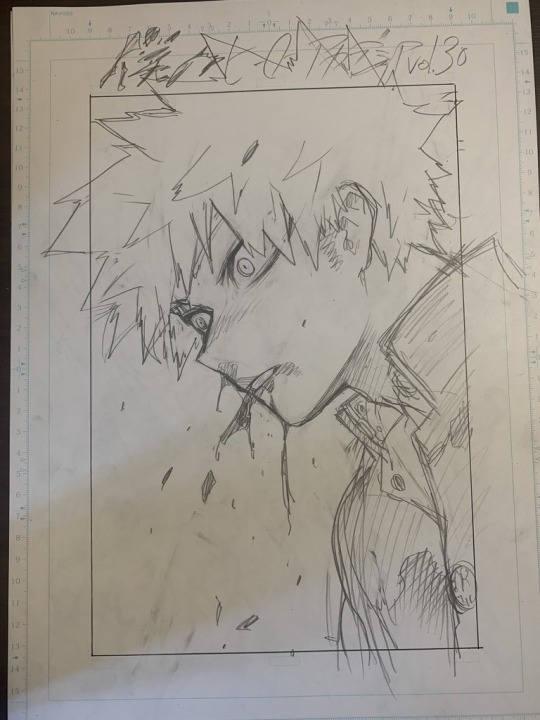
To me, this only cements Horikoshi’s intent that middle school Bakugou must be debunked, killed, discarded, or destroyed in order for Bakugou the hero to emerge, which is why people who do actually excuse his actions or believe that those actions define him into young adulthood don’t really understand the necessity for change, because they seem to imply that he doesn’t need/cannot reach further growth, and there doesn’t need to be a separation between the Bakugou who is, at heart, volatile and repressed the angry, and the Bakugou who sacrifices himself, a hero who saves people.
Plot twist: there does need to be a difference. Further plot twist: there is a difference.
In sacrificing himself for Deku, Bakugou himself doesn't die, but the injury is fatal in the sense that it could've killed him physically and yet symbolizes the selfish, childish part of him that refused to accept Deku, himself, and the inevitability of change. In killing those selfish remnants, he could actually become the kind of hero that we the reader understand to be the true kind.
That’s why I think that a lot of the people who stress his actions as a child without acknowledging the ways he has changed, grown, and tried to fix what he has broken don’t really get it, because it was always part of his character arc to change and purposely become something different and better. If the effects of his worst and his most childish self stick with you more, and linger despite that, that’s okay. But distilling his character down to the wrong elements doesn’t get you the bare essentials; what it gets you is a skewed and shallow version of a person. If you’re okay with that version, that is also fine.
But you can’t condemn others who aren’t fine with that incomplete version, and to become enraged that others do not see him as you do is childish.
Bakugou’s change and the emphasis on that change is canon.
Parallels in Abuse, EnemiesRivals-to-Lovers, and the Necessity of Redemption ft. ATLA’s Zuko
In real life, the idea that “oh, he must bully you because he likes you” is often used as a way to brush aside or to excuse the action of bullying itself, as if a ‘secret crush’ somehow negates the effects of bullying on the victim or the inability of the bully to properly process and manifest their emotions in certain ways. It doesn’t. It often enables young boys to hurt others, and provides figures of authority to overlook the real source of schoolyard bullying or peer review. The “secret crush”, in real life, is used to undermine abuse, justify toxic masculinity, and is essentially used as a non-solution solution.
A common accusation is that Bakudeku shippers jump on the pairing because they romanticize pairing a bully and a victim together, or believe that the only way for Bakugou to atone for his past would be to date Midoryia in the future. This may be true for some people, in which case, that’s their own preference, but based on my experience and what I’ve witnessed, that’s not the case for most.
The difference being is that as these are characters, we as readers or viewers are meant to analyze them. Not to justify them, or to excuse their actions, but we are given the advantage of the outsider perspective to piece their characters together in context, understand why they are how they are, and witness them change; maybe I just haven’t been exposed to enough of the fandom, but no one (I’ve witnessed) treats the idea that “maybe Bakugou has feelings he can’t process or understand and so they manifest in aggressive and unchecked ways'' as a solution to his inability to communicate or process in a healthy way, rather it is just part of the explanation of his character, something is needs to — and is — working through. The solution to his middle school self is not the revelation of a “teehee, secret crush”, but self-reflection, remorse, and actively working to better oneself, which I do believe is canonically reflected, especially as of recently.
In canon, they are written to be partners, better together than apart, and I genuinely believe that one can like the Bakudeku dynamic not by route of romanticization but by observation.
I do think we are meant to see parallels between him and Endeavor; Endeavor is a high profile abuser who embodies the flaws and hypocrisy of the hero system. Bakugou is a schoolyard bully who emulates and internalizes the flaws of this system as a child, likely due to the structure of the society and the way that children will absorb the propaganda they are exposed to; the idea that Quirks, or power, define the inherent value of the individual, their ability to contribute to society, and subsequently their fundamental human worth. The difference between them is the fact that Endeavor is the literal adult who is fully and knowingly active within a toxic, corrupt system who forces his family to undergo a terrifying amount of trauma and abuse while facing little to no consequences because he knows that his status and the values of their society will protect him from those consequences. In other words, Endeavor is the threat of what Bakugou could have, and would have, become without intervention or genuine change.
Comparisons between characters, as parallels or foils, are tricky in that they imply but cannot confirm sameness. Having parallels with someone does not make them the same, by the way, but can serve to illustrate contrasts, or warnings. Harry Potter, for example, is meant to have obvious parallels with Tom Riddle, with similar abilities, and tragic upbringings. That doesn’t mean Harry grows up to become Lord Voldemort, but rather he helps lead a cross-generational movement to overthrow the facist regime. Harry is offered love, compassion, and friends, and does not embrace the darkness within or around him. As far as moldy old snake men are concerned, they do not deserve a redemption arc because they do not wish for one, and the truest of change only occurs when you actively try to change.
To be frank, either way, Bakugou was probably going to become a good Hero, in the sense that Endeavor is a ‘good’ Hero. Hero capitalized, as in a pro Hero, in the sense that it is a career, an occupation, and a status. Because of his strong Quirk, determination, skill, and work ethic, Bakugou would have made a good Hero. Due to his lack of character, however, he was not on the path to become a hero; defender of the weak, someone who saves people to save people, who is willing to make sacrifices detrimental to themselves, who saves people out of love.
It is necessary for him to undergo both a redemption arc and a symbolic death and rebirth in order for him to follow the path of a hero, having been inspired and prompted by Deku.
I personally don’t really like Endeavor’s little redemption arc, not because I don’t believe that people can change or that they shouldn't at least try to atone for the atrocities they have committed, but because within any narrative, a good redemption arc is important if it matters; what also matters is the context of that arc, and whether or not it was needed. For example, in ATLA, Zuko’s redemption arc is widely regarded as one of the best arcs in television history, something incredible. And it is. That shit fucks. In a good way.
It was confirmed that Azula was also going to get a redemption arc, had Volume 4 gone on as planned, and it was tentatively approached in the comics, which are considered canon. She is an undeniably bad person (who is willing to kill, threaten, exploit, and colonize), but she is also a child, and as viewers, we witness and recognize the factors that contributed to her (debatable) sociopathy, and the way that the system she was raised in failed her. Her family failed her; even Uncle Iroh, the wise mentor who helps guide Zuko to see the light, is willing to give up on her immediately, saying that she’s “crazy” and needs to be “put down”. Yes, it’s comedic, and yes, it’s pragmatic, but Azula is fourteen years old. Her mother is banished, her father is a psychopath, and her older brother, from her perspective, betrayed and abandoned her. She doesn’t have the emotional support that Zuko does; she exploits and controls her friends because it’s all she’s been taught to do; she says herself, her “own mother thought [she] was a monster; she was right, of course, but it still [hurts]”. A parent who does not believe in you, or a parent that uses you and will hurt you, is a genuine indicator of trauma.
The writers understood that both Zuko and Azula deserved redemption arcs. One was arguably further gone than the other, but that doesn’t change the fact that they are both children, products of their environment, who have the time, motive, and reason to change.
In contrast, you know who wouldn’t have deserved a redemption arc? Ozai. That simply would not have been interesting, wouldn’t have served the narrative well, and honestly, is not needed, thematically or otherwise. Am I comparing Ozai to Endeavor? Basically, yes. Fuck those guys. I don’t see a point in Endeavor’s little “I want to be a good dad now” arc, and I think that we don’t need to sympathize with characters in order to understand them or be interested in them. I want Touya/Dabi to expose his abuse, for his career to crumble, and then for him to die.
If they are not challenging the system that we the viewer are meant to question, and there is no thematic relevance to their redemption, is it even needed?
On that note, am I saying that Bakugou is the equivalent to Zuko? No, lmao. Definitely not. They are different characters with different progressions and different pressures. What I am saying is that good redemption arcs shouldn’t be handed out like candy to babies; it is the quality, rather than the quantity, that makes a redemption arc good. In terms of the commentary of the narrative, who needs a redemption arc, who is deserving, and who does it make sense to give one to?
In this case, Bakugou checks those boxes. It was always in the cards for him to change, and he has. In fact, he’s still changing.
Give it to Me Straight. It’s Homophobic.
There does seem to be an urge to obsessively gender either Bakugou or Deku, in making Deku the ultra-feminine, stereotypically hyper-sexualized “woman” of the relationship, with Bakugou becoming similarly sexualized but depicted as the hyper-masculine bodice ripper. On some level, that feels vaguely homophobic if not straight up misogynistic, in that in a gay relationship there’s an urge to compel them to conform under heteronormative stereotypes in order to be interpreted as real or functional. On one hand, I will say that in a lot of cases it feels like more of an expression of a kink, or fetishization and subsequent expression of internalized misogyny, at least, rather than a genuine exploration of the complexity and power imbalances of gender dynamics, expression, and boundaries.
That being said, I don’t think that that problematic aspect of shipping is unique to Bakudeku, or even to the fandom in general. We’ve all read fan work or see fanart of most gay ships in a similiar manner, and I think it’s a broader issue to be addressed than blaming it on a singular ship and calling it a day.
One interpretation of Bakugou’s character is his repression and the way his character functions under toxic masculinity, in a society’s egregious disregard for mental and emotional health (much like in the real world), the horrifying ways in which rage is rationalized or excused due to the concept of masculinity, and the way that characteristics that are associated with femininity — intellect, empathy, anxiety, kindness, hesitation, softness — are seen as stereotypically “weak”, and in men, traditionally emasculating. In terms of the way that the fictional universe is largely about societal priority and power dynamics between individuals and the way that extends to institutions, it’s not a total stretch to guess that gender as a construct is a relevant topic to expand on or at least keep in mind for comparison.
I think that the way in which characters are gendered and the extent to which that is a result of invasive heteronormativity and fetishization is a really important conversation to have, but using it as a case-by-case evolution of a ship used to condemn people isn’t conductive, and at that point, it’s treated as less of a real concern but an issue narrowly weaponised.
Love in Perspective, from the East v. West
Another thing I think could be elaborated on and written about in great detail is the way that the Eastern part of the fandom and the Western part of the fandom have such different perspectives on Bakudeku in particular. I am not going to go in depth with this, and there are many other people who could go into specifics, but just as an overview:
The manga and the anime are created for and targeted at a certain audience; our take on it will differ based on cultural norms, decisions in translation, understanding of the genre, and our own region-specific socialization. This includes the way in which we interpret certain relationships, the way they resonate with us, and what we do and do not find to be acceptable. Of course, this is not a case-by-case basis, and I’m sure there are plenty of people who hold differing beliefs within one area, but speaking generally, there is a reason that Bakudeku is not regarded as nearly as problematic in the East.
Had this been written by a Western creator, marketed primarily to and within the West (for reference, while I am Chinese, but I have lived in the USA for most of my life, so my own perspective is undoubtedly westernized), I would’ve immediately jumped to make comparisons between the Hero System and the American police system, in that a corrupt, or bastardized system is made no less corrupt for the people who do legitimately want to do good and help people, when that system disproportionately values and targets others while relying on propaganda that society must be reliant on that system in order to create safe communities when in reality it perpetuates just as many issues as it appears to solve, not to mention the way it attracts and rewards violent and power-hungry people who are enabled to abuse their power. I think comparisons can still be made, but in terms of analysis, it should be kept in mind that the police system in other parts of the world do not have the same history, place, and context as it does in America, and the police system in Japan, for example, probably wasn’t the basis for the Hero System.
As much as I do believe in the Death of the Author in most cases, the intent of the author does matter when it comes to content like this, if merely on the basis that it provides context that we may be missing as foreign viewers.
As far as the intent of the author goes, Bakugou is on a route of redemption.
He deserves it. It is unavoidable. That, of course, may depend on where you’re reading this.
Stuck in the Sludge, the Past, and Season One
If there’s one thing, to me, that epitomizes middle school Bakugou, it’s him being trapped in a sludge monster, rescued by his Quirkless childhood friend, and unable to believe his eyes. He clings to the ideology he always has, that Quirkless means weak, that there’s no way that Deku could have grown to be strong, or had the capacity to be strong all along. Bakugou is wrong about this, and continuously proven wrong. It is only when he accepts that he is wrong, and that Deku is someone to follow, that he starts his real path to heroics.
If Bakudeku’s relationship does not appeal to someone for whatever reason, there’s nothing wrong with that. They can write all they want about why they don’t ship it, or why it bothers them, or why they think it’s problematic. If it is legitimately triggering to you, then by all means, avoid it, point it out, etc. but do not undermine the reality of abuse simply to point fingers, just because you don’t like a ship. People who intentionally use the anti tag knowing it’ll show up in the main tag, go after people who are literally minding their own business, and accuse people of supporting abuse are the ones looking for a fight, and they’re annoying as hell because they don’t bring anything to the table. No evidence, no analysis, just repeated projection.
To clarify, I’m referring to a specific kind of shipper, not someone who just doesn’t like a ship, but who is so aggressive about it for absolutely no reason. There are plenty of very lovely people in this fandom, who mind their own business, multipship, or just don’t care.
Calling shippers dumb or braindead or toxic (to clarify, this isn’t targeting any one person I’ve seen, but a collective) based on projections and generalizations that come entirely from your own impression of the ship rather than observation is...really biased to me, and comes across as uneducated and trigger happy, rather than constructive or helpful in any way.
I’m not saying someone has to ship anything, or like it, in order to be a ‘good’ participant. But inserting derogatory material into a main tag, and dropping buzzwords with the same tired backing behind it without seeming to understand the implications of those words or acknowledging the development, pacing, and intentional change to the characters within the plot is just...I don’t know, it comes across as redundant, to me at least, and very childish. Aggressive. Toxic. Problematic. Maybe the real toxic shippers were the ones who bitched and moaned along the way. They’re like little kids, stuck in the past, unable to visualize or recognize change, and I think that’s a real shame because it’s preventing them from appreciating the story or its characters as it is, in canon.
But that’s okay, really. To each their own. Interpretations will vary, preferences differ, perspectives are not uniform. There is no one truth. There are five seasons of the show, a feature film, and like, thirty volumes as of this year.
All I’m saying is that if you want to stay stuck in the first season of each character, then that’s what you’re going to get. That’s up to you.
This may be edited or revised.
#bakudeku#meta#my hero academia#boko no hero academia#bnha#mha#bakugou katsuki#izuku midoriya#ok these are just my general thoughts in response to the people who have hang ups about this ship#like y’all need to pls chill tf out ok#this is also not comprehensive and could definitely be elaborated on#but it’s just general thoughts#it’s just addressing general opposition I’ve seen#I never thought I’d ever write this much about this ship wtf
136 notes
·
View notes
Text
So I keep seeing this sentiment used in pointing out the differences between Hawks vs Twice and Midoriya vs Shigaraki (often used to prove how Midoriya is a true hero unlike Hawks) that Hawks never understood Twice, or even tried to understand him before he killed him, which... what?
Not only do I think that’s not true (or at least, not to the extent that people claim), but even if Hawks did understand Twice, knowing his entire tragic life story, understanding the bonds of the League of Villains... would that even have made a difference?
There are a lot of differences between the characters of Twice and Shigaraki. Twice kills people in order to protect his friends - the bond he found with the League is what his entire character revolves around - whereas Shigaraki kills because he was brainwashed into thinking that that’s his purpose. He was born to destroy - so why not destroy everything he doesn't like about society? Simple as that.
Because what drives them are so different, the process of ‘saving’ them - breaking them away of that motivation to kill and do active harm - would be different as well. Midoriya can appeal to that crying child inside Shigaraki, showing him that he is more than just destruction incarnate. Midoriya would also have to get past a wall of hatred towards... just about everything (but him especially) in order to get that message across - how he manages to do that, I have no idea - but we still have quite a bit in the story to go. Meanwhile, in order for Hawks to have successfully saved Twice, he would have had to come in between the bond that Twice shared with the League.
I know that there are several people that tout the LoV as a ‘found family’ but... it’s not. It’s not a healthy environment in the slightest. The entire League revolves around their status of outcasts and their hatred of society - but while it’s nice to have friends that can understand your past, the fact is that the League does not do anything to take a step forward and move on from sitting in their negative emotions. They ‘express themselves’ sure - by killing and doing whatever they want, but that’s not self-improvement. It may give them a temporary feeling of satisfaction, but at the end of the day, they’re as stagnant and lost as ever, enabling each others worst habits. It’s completely unhealthy - and one of the worst type of environments Twice could have found himself in.
Twice - who has little to no self-worth of his own - found himself surrounded by a bunch of people with similar sad backstories and who were also social outcasts like him. They also happened to be murders. Because they showed the smallest appreciation and kindness towards him, Twice was then given purpose - do whatever it takes to protect his friends. That’s the motivation that led him to overcoming him drama and breaking out Sad Man’s Parade. Unfortunately, while the League did give Twice senses of direction, purpose, and belonging, they didn’t do much to actually give him the proper help and care he needed (and vice versa - in protecting his friends, Twice is also protecting the status quo). I’ve said it once and I’ll say it again - it was no coincidence that, while Twice managed to miraculously ‘overcome his trauma’, his split-personality condition was stated at the end of the MVA arc as becoming worse. The League enables each other’s worse habits - and while Twice did grow during MVA, it was in the wrong direction. Coincidently, I think MVA is also the point where Twice can no longer be saved.
So, in order for Hawks to miraculously have saved Twice, he would have to had come between his bond with his League - aka his entire reason for living. And Hawks did do exactly that - he destroyed clones of all the League members for crying out loud. But still, some people assume that Hawks didn’t understand Twice - didn’t understand his backstory, nor his connection to the League.
I’ll be honest, we never got a panel of Hawks thinking about said connection (or at least, not that I remember), so there’s no way to know exactly how much he knew about Twice. But Twice was one of the villains that Hawks had information on (the only ones he didn’t were Dabi and Shigaraki), and the two hung out fairly frequently. Hawks could have known all about his past, or maybe he knew nothing at all. He didn’t know about Twice’s trauma with being double-crossed by Overhaul, leading to the death of Magne - so again, who knows how much he knew? Even if Hawks looked over Twice’s case file though, that still wouldn’t have changed the fact that he would have had to overcome his connection with the League - which leads me to my next point.
Hawks definitely understood Twice’s connection to the League. Or at least, he knew that his love of them was the motivation of his crimes. Hawks admired Twice because he was a kind person - he wanted to be useful to his friends, just like Hawks did. However, that same drive can also be dangerous. If Hawks thought that Twice’s level of commitment to the League wasn’t so strong, that Twice would automatically agree with him and accept his offer when he started talking, then Hawks wouldn’t have sent almost all his feathers to surround him. Twice was a kind person - and that’s exactly why he was such a threat.
So, in order to surpass the bond that Twice shared with the League, Hawks would have had to do one of two things: 1 - gain Twice’s unwavering trust so that he accepted his deal or 2 - show Twice that he has more inherit value than he gives himself credit for, giving him another motivation besides the League.
Scenario 1 was what Hawks attempted to go with, though it was doomed from the start. As soon as Hawks double-crosses Twice, reveals himself as a spy, he’s immediately clocked in shadow, seeming monstrous from Twice’s perspective. Any trust Twice had extended Hawks was immediately broken. This doesn’t help that Hawks has to come out with a bunch of sharp feathers pointed in his direction. No matter how much he liked Twice, he was still an active threat, and Hawks needed to be able to act at a moments notice in case he resisted (which of course, he did).
I’ve seen some people suggest that Hawks could have promised that the League would be safe, that his failing was that he didn’t understand the entire League the way Twice did - that if Hawks had just calmly approached him beforehand without the feathers, told him the situation, promised that he’d get the entire League help the same way he promised he would with Twice, everything would be fine. But - there’s no guarantee that Twice would agree with that. During their months together, none of the League have ever tried to reach out to get help with the intention of improving themselves. The status is that they have to maintain their way of life - aka them doing whatever they want with no repercussions. In order to get proper help, that would have to change. Twice protecting the League means protecting their way of life and any active threat against it. Again, as soon as Hawks came out as being a spy on the heroes side, Twice’s immediately distorted him into something monstrous. With his former trauma with Overhaul, I believe that - no matter what the scenario - Twice would have immediately lost all trust in Hawks. Therefore, there was no hope that option 1 would work.
But what about option 2 - giving Twice some self-worth, and giving him some motivation outside of the League? Well, I think that would also be impossible - at least, for Hawks anyways. Because, like it or not, Hawks and Twice have the same fatal flaw - aka they both have little to no self-worth outside of being useful to the people they want to protect - to the point that either would happily lay down their lives if it meant the people they care about could be happy. The only difference is that Twice’s care extends only to the League whereas Hawks’ extends to the whole of society. In order to give Twice that sense of self-worth, Hawks would first have had to found some in himself - a little hard to miraculously do, considering he’s on an undercover suicide mission. The tragedy of Hawks vs Twice is that, at the end of the day, they were both kind characters - which meant they both had the same ‘unbreakable will’ that make up some of the most dangerous characters (according to Hawks).
Even if it the person that fought Twice wasn’t Hawks (which first off - good luck to anyone but Hawks dealing with Twice’s clones), this second option still requires some deal of trust - which meant you’d have to find a hero or anyone who Twice wouldn’t have thought of as an immediate threat to his friends. Twice didn't hesitate to attack Midoriya or the UA students at the training camp - what makes anyone so sure that if Midoriya faced Twice, there would be a different result?
So in synopsis, I think Hawks did understand Twice enough before the fight (at least to know what drives him) - but even if Hawks did know every. single. little. thing. about Twice's life, it wouldn’t have made a difference.
In order for a character to be saved - in order for them to start their redemption - they have to want to change. That is the key difference in what makes a person savable or un-savable. However, by the time of the PLF arc, Twice is actively choosing to side with the League - and nothing Hawks could do was going to pull him away from that.
How Midoriya will convince Shigaraki to want to change is something we’ll have to wait and see.
92 notes
·
View notes
Text
Where, Oh Where, Did My Dream of Jasper Hale Go?
I’ve said it once and I’ll say it again. Why did Jasper Hale have to be a Confederate? What point was Meyer trying to do with such information, especially when she refused to go into how Jasper might have related to the goals of the Southern states entering the Civil War?
In my mind, I have an image of Jasper that contrasts the Jasper Meyer presents. I worry how easy it is to admire the character and forget his narrative purpose as we also rewrite the original.
I could have waved my Jasper crush loud and proud, but was first forced to hide under shifty eyes and a troubled soul, then just acknowledge that Jasper was both a racist creation and a racist with no redemption arc.
This is my lament. And the beginning of why/how I think Jasper’s existence in the series as a character and as a product/device for creative narration is racist in of itself.
After dropping such a bomb, Meyer proceeds to never address it ever again. Bad for several reasons:
From a narrative, story-building standpoint, you only add certain details to a character if we’re going to use that to add some sort of layer to their personality and actions. Jasper being a soldier is fine. Necessary for him to be swept up in Maria’s newborn wars and be chosen by her specifically for those wars. Jasper being an American, fine, cause the Cullens are in that country for most of their development and he had to easily meet Alice. (Even vampires usually keep close to their national origins). Jasper having run away from home to join the army? Fine. Edward was about to do the same and it was a thing young adult men did when wars were expected and more common.
However, out of all the historical options (Union soldier, Mexican American war, any other South of U.S./post 18th century war), Meyer chooses one of the most unequivocally morally bankrupt positions to have in the course of human history). And after its revelation, we don’t get to know how even if Jasper believed in the subjugation of Black people under white men. Why did he join the Confederacy? If it was to allude to the brainwashing of poor whites by rich planters to get them to be more sympathetic to them instead of the Black folk-- who they practically had much more in common with--and Jasper was one of those very impressionable persons (young and wanting to prove himself. Was his family even poor? The lack of consideration?!!), then why not just show that instead of leaving such pertinent information? It could have made Jasper irredeemable even then...unless you also show how and if he ever changed his sentiments.
Why are we given so much guesswork?! A fiction/fantasy writer tickles their readers’ fancies, not leave all the psychological and deep historical analyses to them to the point where they’re writing the story!!!
I shouldn’t be making your character for you. And you shouldn’t be pretending to give me something whole when only giving me half. There’s a difference between mystery, suggestiveness and just pretending that the things that everyone already knows exists (racism) don’t exist or don’t have a great weight in influencing people’s decisions and motivations. In Twilight and with the presence of Jasper, all it does is:
create a nonperson (who is Jasper other than an accessory/narrative tool for Edward and Bella’s relationship to survive the newborn invasion? And for Bella to finally get to “know” all the Cullens to prepare her entry?)
create a space for unconfronted or questioned feelings and ideas (Some readers’ first thought reading Jasper’s story--at least those not thinking enough about race: “I know something’s wrong here, but I can’t think of what and but now Jasper seems to have reformed, so I don’t care because I know he’s supposed to bad!”)
diminish the evil, extent, and dominance of white supremacy: ”ooh, look it’s possible that Jasper is to be a better person so I shouldn’t look at his position in racism too closely. Maybe racism isn’t all that bad, or it’s over [Jasper got over it], or maybe racism has an easy solution.”
Maybe one will argue that Meyer really wants us to dislike Jasper (because it’s so obvious that racism and the slave system was bad, stop being so dramatic) just so he provides a foil against Edward, Carlisle, and Emmett. Which is so boring and flat. And misguided. If we imagined Jasper as literally anything apart from the the Confederacy or any “cause“ that was less directly anti-black, then I wouldn’t be so hostile towards the guy.
Literally, I think that Jasper would have been, if not a “perfect”, morally good person, then a cool mofo. Guy can take three vampires at once apparently, and he has got the scars to prove it! He also has a tormented but determined constancy that I can’t personally help myself swooning from. You could get all of that with any other war, because war is grisly and reveals how far people will go to have power over others, feel powerful, and/or defend themselves. The concessions they make, the sins they commit, and the psychological toll that comes with it all.
So the Confederacy? Why? Why!?
For the cheap shock value and black-and-white thinking that will get us to think more about Edward x Bella, that’s why. And to avoid any more work/responsibility that comes with showing the repercussions of racism.
And it’s disgusting, because what’s left is racism unaddressed. And of looking deeper into Jasper’s personality and of how Jasper might still be racist and most likely still is.
And it robbed me of a possible, good time.
Fuck you Meyer.
#jasper#jasper hale#jasper cullen#twilight#twilight saga#twilight series#the twilight saga#the twilight series#twilight characters#twilight character#twilight racism
16 notes
·
View notes
Text
Why did Jeremiah want Ecco dead, and how did he pull it off?
It is my solid belief that Jeremiah wanted Ecco to die, and I have several reasons why. It starts when he was sprayed, however back then it was more of an indifference to if she died or not. If you think about what he made her do, he made her shoot herself, he put her in the bunker to keep Jim there with the chance that it could blow up with her still in it, he almost definitely made her be the one to converse with all the dangerous gangs and criminals to exert his dominance over them. All were high risk situations where she could have died, but there was always a chance that she wouldn’t. We know that a lot of Jeremiah’s relationships were fuelled by obsessions, but I don’t think he was obsessed with Ecco as a person, I think he was obsessed with the fact that he had been able to manipulate a person so well into being entirely devoted to him and changing their personality and manner, and Ecco was just the walking embodiment of that. Alongside her being useful due to this, by keeping her around he was constantly reminding himself of his achievement in making her who she was. He saw her as a possession of his own creation, but as he was just obsessed with that and not actually Ecco herself, she was expendable, but precious enough to allow a chance at living.
Which means that something changed between 5x07 and 5x12 in that ten years, something that changed Jeremiah from not caring if she died, to wanting her to die. That difference is evident in the finale, because if he didn’t actively wish for her to die, I imagine that he would have just left her dying with the stab wound, rather than ensuring that she would definitely die. There was a chance that she could have survived, I don’t know tons about stab wounds but people in Gotham have survived much worse injuries, Jeremiah has survived much worse injuries. But for once he didn’t allow her to have that chance.
This brings us to the ultimate question: why would Jeremiah want Ecco dead? She was loyal, he knew that she would do what he wanted, and he had his own personal protection wherever he meant. Clearly, the big event linking this change was the 10 years he spent in Arkham. Obviously we don’t see much of them there, but we see enough to establish that Ecco was his nurse and the person he solely relied upon, he used her to get information in and out and as far as we know, for a very large chunk of that 10 years she was the only person who knew he wasn’t braindead. Now, that has some very striking similarities to the role she played when she was his proxy, as back then he was reliant upon her to do so much, without her being able to leave the bunker he would have struggled a lot more. He was very dependent upon her, and at that point, I don’t think he minded. However, when he got sprayed and certain elements of his personality were intensified, the arrogance and self-obsession did as well, and he no longer wanted to be dependent upon someone, he believed himself to be the most important person that doesn’t need to answer to anyone. He brainwashed Ecco to flip it around, she was now the one dependent on him, and he had the full power.
When he went to Arkham, he no longer had that control over her. Ecco had no guidance, and automatically switched back into the role that she was most comfortable doing: looking after him. We don’t know how long Jeremiah was pretending to be brain dead, but when he woke up, he had to start pretending straight away. There was no way he could have done it without Ecco. Once again, their roles had been reversed and he was once again solely relying upon Ecco to look after him, to carry out everything he needed done, and to make sure he wasn’t discovered. He must have resented the fact that she could do everything he wanted to do, all his anger about having to wait for the right moment was now being channelled into his relationship with her, because that was the only real relationship he had at that moment in time. Unlike before, he no longer had an outlet for his anger. He couldn’t move, the only thing he could do was think. That would be enough to drive you further into madness, and to warp feelings towards someone else into negative emotions because that’s all you know. If Ecco brought him any messages from the outside, for example the news that Bruce had left Gotham, he couldn’t see them to develop hatred towards them, and so he does towards the nearest person at the time, which is Ecco. The resentment that he was dependent on her once more, the mixed messages in his brain from madness and the anger he felt for others all manifested itself into him beginning to develop very negative emotions when she was around.
But when does the line between disliking someone and wanting someone dead get crossed? For me, there’s two main reasons, and the first goes back to the point that she was acting very similar to her proxy phase. Not only was it echoed in actions, it was also similar in terms of her movement, body language, facial expressions, and appearance. She is quiet, stoic, she delivers her actions swiftly and with no theatrics. Sure, she had to blend in, but she didn’t need to when she killed the two men in Jeremiah’s cell.
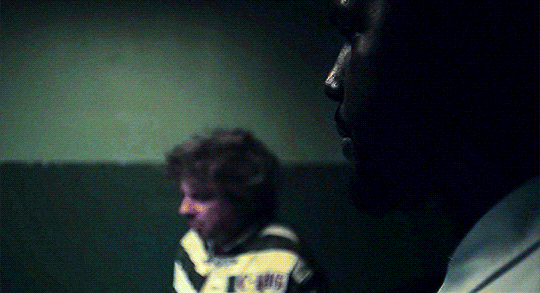
That reminded me of the scene where Jeremiah gets her to shoot the two guards, she does it with no hesitation, silently, deadly. Without the constant influence of Jeremiah being able to control her with words and actions, the façade he built up for her is ebbing away, and surfacing is the Ecco that was always still there, just hidden under the many layers of devotion that Jeremiah had built up. It’s not a quick process, she still has the same voice and wording as she does before, but she’s definitely changed from the person she was in 5x07. Note how she’s still in Arkham when I say this, because the rapid change in her between Arkham and Barbara’s club is important and I’ll get to that later. Essentially, what Jeremiah is seeing before him is all his work that he put in to manipulating her is fading away, that his power over her is no longer as strong as it was. Which makes him question: if it’s happened once, what’s to say it won’t happen again if he manages to brainwash her again? It’s bad enough letting people know that her manipulation wasn’t strong enough to hold when he wasn’t there to constantly enforce it, but for it to fail a second time? He could not allow it. The only solution for him to protect his status and for her to not break free from him, was for her to die.
Furthermore, her acting like his proxy again would have really brought him back to who he was the last time she acted like this, the man that had to fight so hard against his true nature that it made him ‘weak’. He did not want to be that person again, being terrified of his brother, hiding away for years because he couldn’t face the world. Ecco was a constant reminder of that, and I do think that he decided that Ecco was a very strong link between his past and present self, and the only way that the link would be severed would be for her to go away completely. Maybe that is what he tried to do initially instead of killing her, to make her into a different person with a new appearance that wouldn’t remind him of the labyrinth every time he looked at her, but he realised that it really was only a temporary fix and the only way to truly cut off his past was to destroy it. That’s what he did with the labyrinth itself, and it seems fitting to him to destroy all parts of it, including Ecco.
The second reason does have links to the first, and it is his vulnerability inside of Arkham. He pretty much had to be guided with Ecco, she was his ears, his eyes and his legs outside and inside Arkham. He had to let her, there was no other way that it could have worked to the extent that it did. He isn’t able to defend himself with words or physically, but also cannot do anything for himself, he can’t wash himself, dress himself, feed himself etc without dropping his act. The person who is seeing this helplessness first-hand constantly is Ecco. Jeremiah canonically sees himself as this godly figure, one who is all-powerful, who people look up to. To him, being vulnerable is not an option. Being helpless is unthinkable. How could he ever allow someone who saw him in that state live? He may not be able to forget, but he could get rid of any reminders, and also eliminates the idea that people would see Ecco and recognise her as the person who kept him alive, he can’t have anyone on the same level as him, he is alone in his own hierarchy and it must remain that way.
So, that’s pretty much the reasoning behind why I think Jeremiah wanted Ecco dead. Which led me to think how did he manage to pull it off, how did he manage to kill someone who was very smart, a great fighter, and had escaped many dangerous situations before? This leads us back to that sudden switch between Ecco killing the guards and Ecco who is the bait for Barbara. Right, we know that Ecco is more ditzy and less collected when she’s in that state of mind, but examining her behaviour in the scene when she holds the knife to Barbara’s throat, she’s even more off, she’s not focusing on anything, she just seems a lot more relaxed which is such a major difference to how she was in Arkham that it seems too different to be true. I think it is, I think Jeremiah drugged her. He has the access, being in Arkham, and if he asked for it, Ecco would get it for him. I don’t know specifics about medicinal drugs but I imagine that getting something with relaxing properties isn’t exactly uncommon for Arkham, where they need to keep their residents as calm as possible. All he needed to do was get it into her system, Francesca has said that the deleted scene in Arkham involved Jeremiah pulling her into his lap from grabbing her face, kissing her and then carrying her out in his arms. My theory is that he did that as a distraction as he didn’t know how this changing Ecco would react to him trying to inject her, so it would have been easy to inject her when she was distracted and in that close proximity.
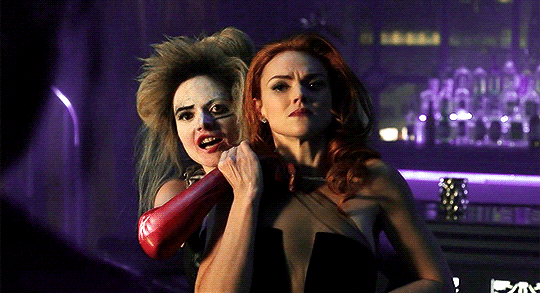
Not only would drugging her affect her reflexes, lengthening them and making her more vulnerable to attack, but he also armed her with a knife. We have seen Ecco use a knife before, but we know that she’s much more comfortable with a gun as that is the weapon we see her with the most, and holding someone at gunpoint is going to be a harder situation for the person to get out of, as one movement and bang, you’re dead. With a knife it requires more force and will take longer, even if it is held at the throat. Jeremiah knows Barbara is a skilled fighter, he’s met her twice before and seen her fight, he would have known that she would have been able to disarm a weakened Ecco and stab her. Which is also why he doesn’t make any attempt to restrain her, the only thing stopping her from disarming Ecco is Ecco’s hold on her, which wouldn’t have been that strong if she were drugged and easily distracted. If he really wanted to ensure Ecco’s safety, he could have binded her, or given Ecco a gun, or even shot her in the leg straight away. But he didn’t, and everything worked out like he thought it would. Barbara broke free, Ecco was too slow to fight back, and she was stabbed. Something that would look like an accident to her, but it was completely planned.
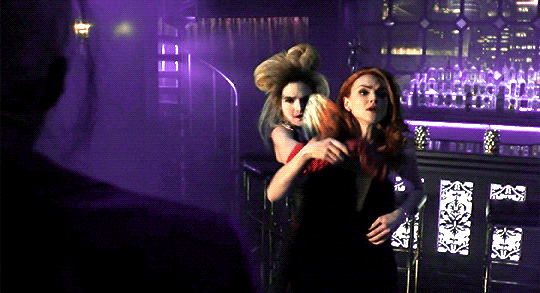
(note how Jeremiah waited until after Ecco was disarmed to turn around)
It’s clever, yes it is clever, but it’s the cruellest thing to do to a person that has devoted their entire life to you. Making it so that she was completely defenceless so she didn’t even have a chance to protect herself. This is why I don’t follow the theory that he shot her out of mercy, he shot her to finish the job that he had set out to do a long, long time ago.
#so i sent this to Kat a while back and finally got the courage to post it#idk why i was worried about this but i have thought about this a LOT#and this is just my opinion on the matter#and plus i made gifs#don't steal them#i'm also going to sleep now but i would like to hear your thoughts#do you think it was an act of mercy or do you think he wanted her to die?#i think my opinion's pretty clear lmao#gotham#ecco#jeremiah valeska
42 notes
·
View notes
Text
The Falcon and the Winter Soldier: The Whole World Is Watching (1x04)
Well, uh... shit. Whole review under the cut for spoilers.
Cons:
Okay, honestly, I don't know how to feel about Lamar's death. If you watch this episode, it's very much this thing where the black sidekick gets killed so the white "hero" can go crazy and get his revenge, to fuel his need for vengeance and display his man pain. Now, I think the fact that John Walker is not really meant to be sympathetic here does help a little bit, but I was still pretty miffed at that unceremonious slaughter of a man of color in order to further a white man's narrative. Maybe I'm just primed to be on the lookout for this stuff. Maybe it's different/less egregious because this isn't an all-white show with one token black character? In any case, I was made uncomfortable by the trope I saw playing out in front of me. If I'm wrong, please let me know.
I continue to wrestle with the same overall issues that I have from minute one. The bad guys make good points, and Sam is sympathizing, but things are escalating. How does this end? Sam takes the shield, tries to save Karli but ultimately can't find a way to do it, so she dies? I don't know how I feel about that. But what other options have we been presented with?
We have the continued echo of Bucky chastising Sam for not taking the shield. Now, as I've mentioned in earlier reviews, I don't mind the fact that Bucky is upset, or angry, or lashing out. He's wrong, but he's not wrong to feel how he's feeling. The thing is, I feel like Bucky has had multiple chances to state his position, and Sam hasn't had the chance to really take a stand and state his. Bucky isn't letting it go, and it's getting to the point where it's not okay. Feel your feelings, James Buchanan Barnes. But it's not Sam's job to take care of your emotional state and behave the way that would be the most comforting for you.
Pros:
But now that I've chastised Bucky for his behavior, I do want to talk about him and the Wakandans in this episode. Especially Ayo. That opening scene... I tell you, my soul traveled back in time to 2014 and I was weeping in a movie theatre over Bucky and Steve and brainwashing and love breaking through brainwashing... it was really moving, to see Bucky fall apart over being free at last from his trigger words. And yes, I will be overanalyzing the fact that there was a flash of the "with you 'til the end of the line" moment when the word "homecoming" was said... that's the good shit. Thank you.
And then it's so brilliantly coupled with later on, while they're fighting, and Ayo disarms Bucky. Literally. That... gave me chills. Just from like a... Bucky is an amputee, and the people who saved him, who deprogrammed his brainwashing, who gave him his amazing superpowered arm... they have control over his body. They can weaken him with hardly any effort at all. I was shocked to see it, and I feel like there's a lot that could be explored there with regards to Bucky's trauma, and trust, and healing journey. Ayo was a friend. Ayo and Shuri saved his life in a very real way, and then there's this moment where he realizes that once again he can't be totally free and safe with someone. I thought it was really effective storytelling with just a few brief moments of the script.
But moving on to Sam, and speaking of trust!! His conversation with Karli, Karli calling Sam's sister... oh man oh man. All of this was so juicy, so intense. I like that Sam sympathizes, that he agreed with her cause just not with her methods. He's speaking that truth out for all to hear. John Walker is focused on eliminating a threat, whereas Sam sees the full complexities of the situation. It's why Walker with the serum is bad news, and why Sam... well, Sam would become more of himself, and I can only imagine that as a good thing for the world at large.
It was so intense, and so frustrating, to see Sam actually getting somewhere with Karli and then having Walker ruin it by coming in and interrupting. And then to see the switch flip, when Karli dared to threaten his family. Sam shows up dressed as the Falcon, and he is not playing games. That was such a great showcase of Sam's compassion, the person he is at his core. But he's also a bad-ass and he won't let anything bad happen to those he loves.
I also like the complexity of Sam (and Bucky to a lesser extent) decidedly not happy with John Walker, not willing to work for him or even with him towards a common goal... but there's sort of a bigger loyalty question which is that neither Sam nor Bucky are "anti Captain America," and they know how bad it would be if the Flag Smashers actually succeeded in killing him. Realizing that Karli had called Sam in as a distraction to get him away so that the new Captain America could be killed, Bucky and Sam of course race to the rescue. That whole sequence was really intense. I don't like John Walker. In fact I rather hate him. But I also really felt the urgency that Bucky and Sam were feeling to do right by everybody in the situation.
So that brings us to Zemo managing to escape in the chaos of the Dora Milaje, the Flag Smashers, John Walker and Lamar, and Sam and Bucky, all going head to head. Bucky and Sam are just trying to stop anybody from dying in this whole mess, but they each have their competing and complex thoughts about the situation as well. Zemo sneaking out, after being such a weirdo and kind of helping but also just being obtuse on purpose, was such a great tension-builder. He's a sinister character who also adds some dark comedy to proceedings.
Let's talk about Sam and Bucky and how they should get married.
No but really, I've expressed some frustration with Bucky's behavior, but ultimately this show is about the loyalty between these two men who have been through so much together, who have so many shared experiences and traumas, but who also can't possibly understand each other's perspectives fully. There's the moment when Walker calls Sam "your partner" when talking to Bucky, and Bucky immediately affirms that Sam is capable of talking to Karli, backing up his play, and then says "he's not my partner." There's a defensiveness there, but then an undeniable loyalty. When Sam tells Bucky that Karli told him to "come alone," Bucky doesn't miss a beat before saying "I'm coming with you." When they're in the middle of a fight, they back each other up. Sam checks on Bucky after the arm thing I mentioned earlier. They've fallen into being partners with each other without really dissecting if it's what they want. This stuff is catnip to me, truly. I can't wait to see where they land in the final episodes.
John Walker fucking cutting a dude to pieces with Captain America's shield in broad daylight and with multiple phones on him, recording it all... well, damn, Disney. That's quite the image to linger on. Obviously this is going to be A Situation. I knew something was going to break bad with John Walker, I just didn't know exactly what it was going to be. Lamar's death doesn't sit right with me. I feel like Walker might have gone off the deep end even without that particular catalyst. But the fact of his breakdown was really chilling, and effectively shot, and is sure to lead to intense consequences in the final two episodes!
Man, I'm sad it's coming to an end so soon... I want so much more of Sam Wilson, please and thank you!
8.5/10
#review#fatws#fatws review#the falcon and the winter soldier#the falcon and the winter soldier review#falcon and the winter solider#falcon and the winter soldier review
12 notes
·
View notes